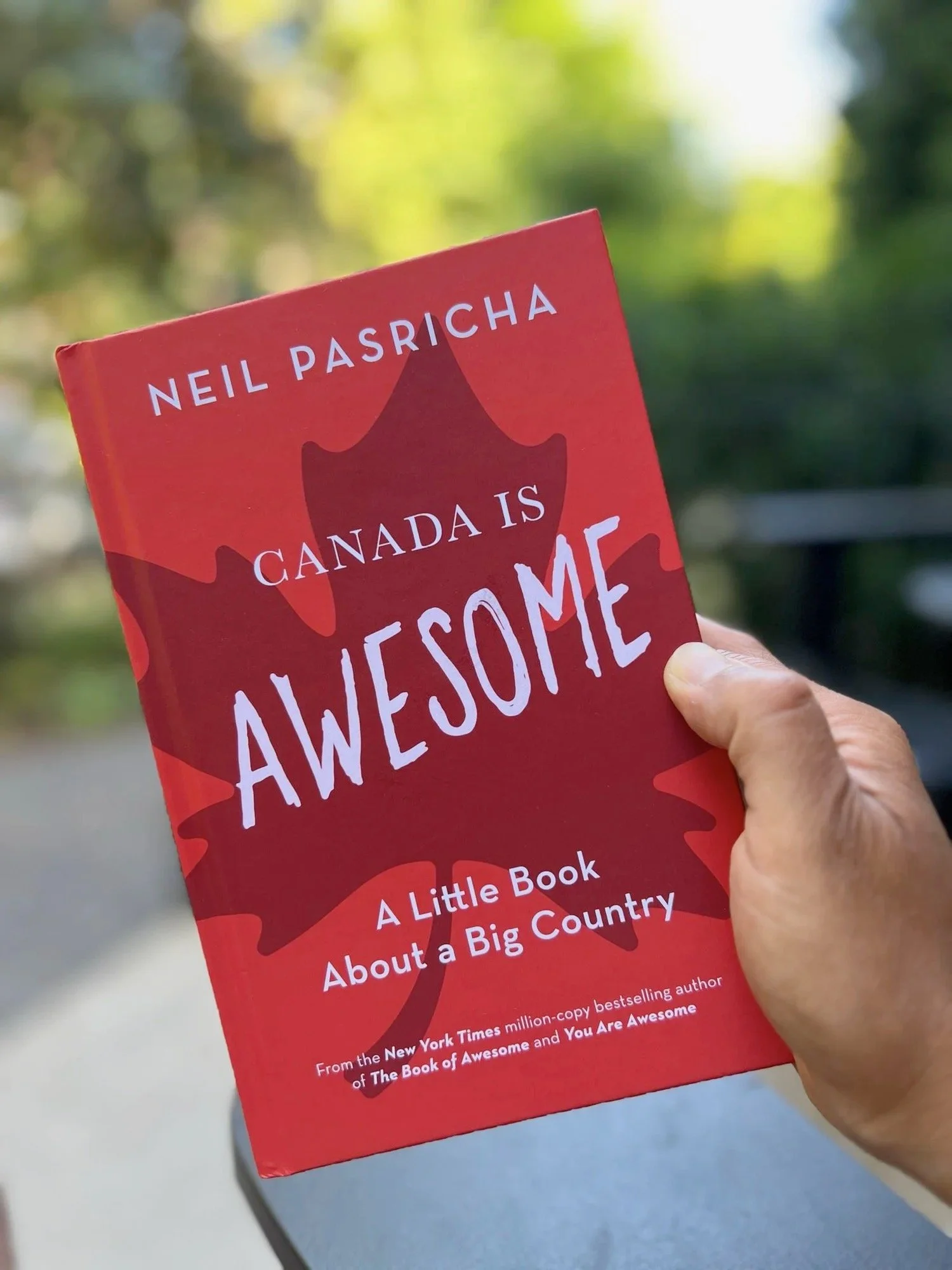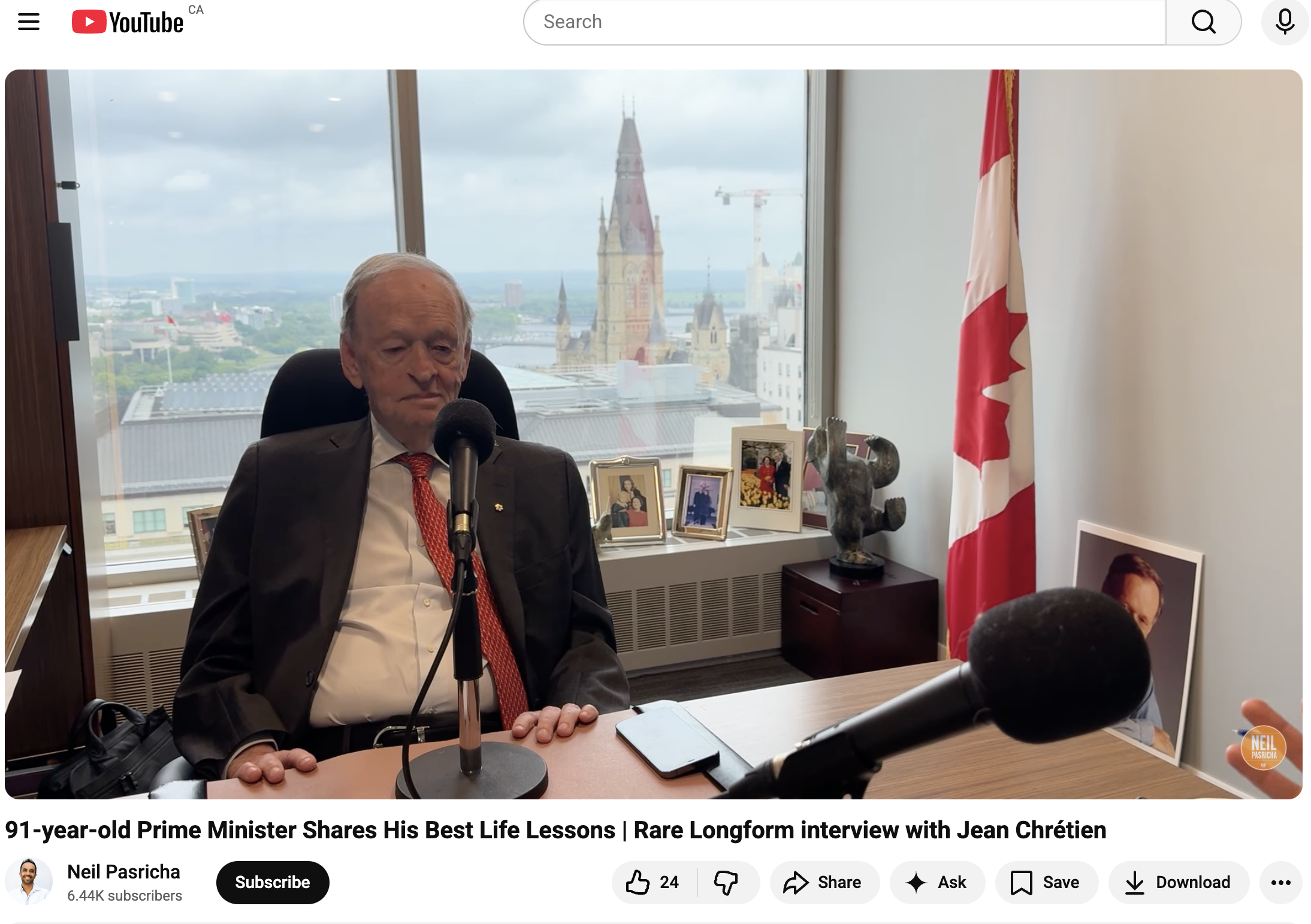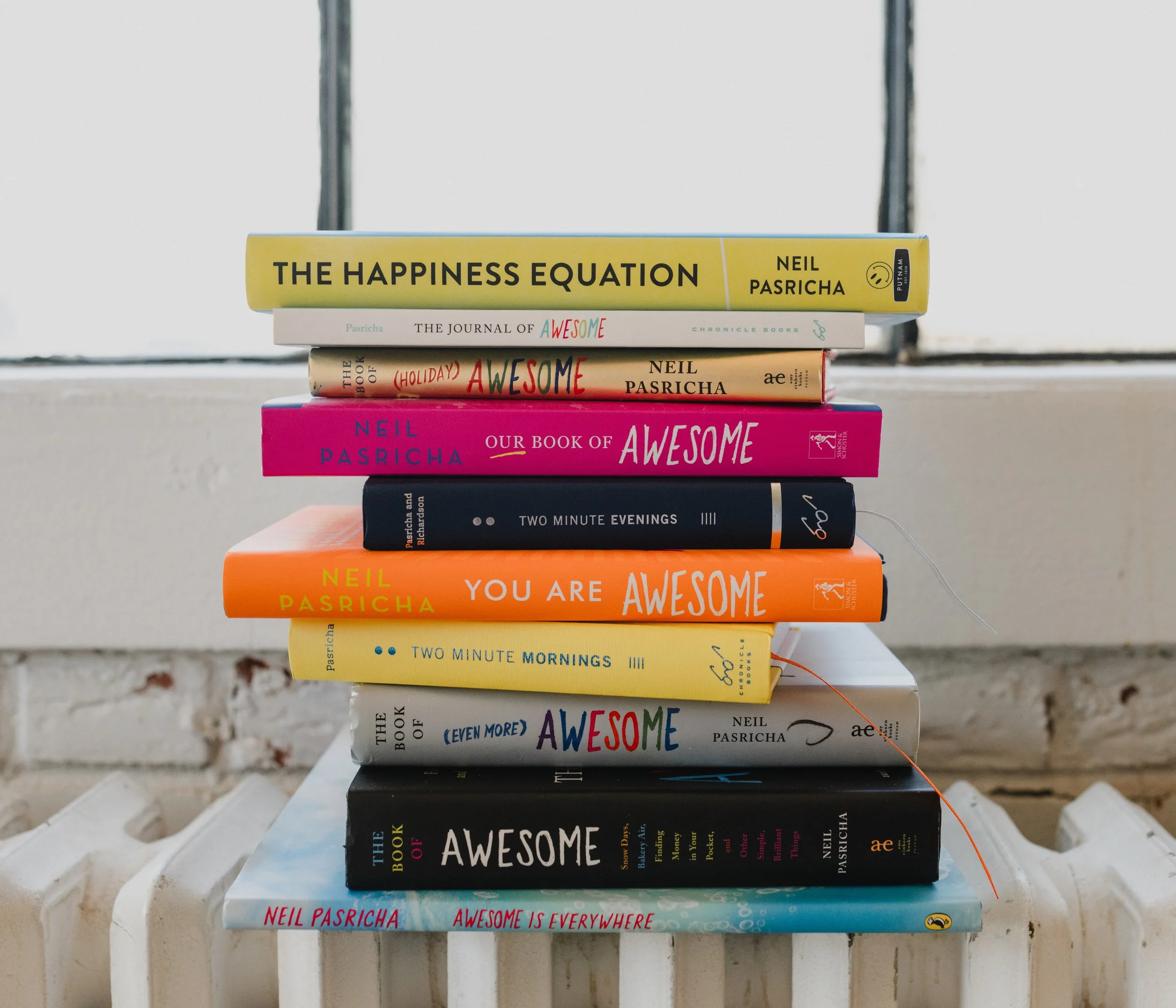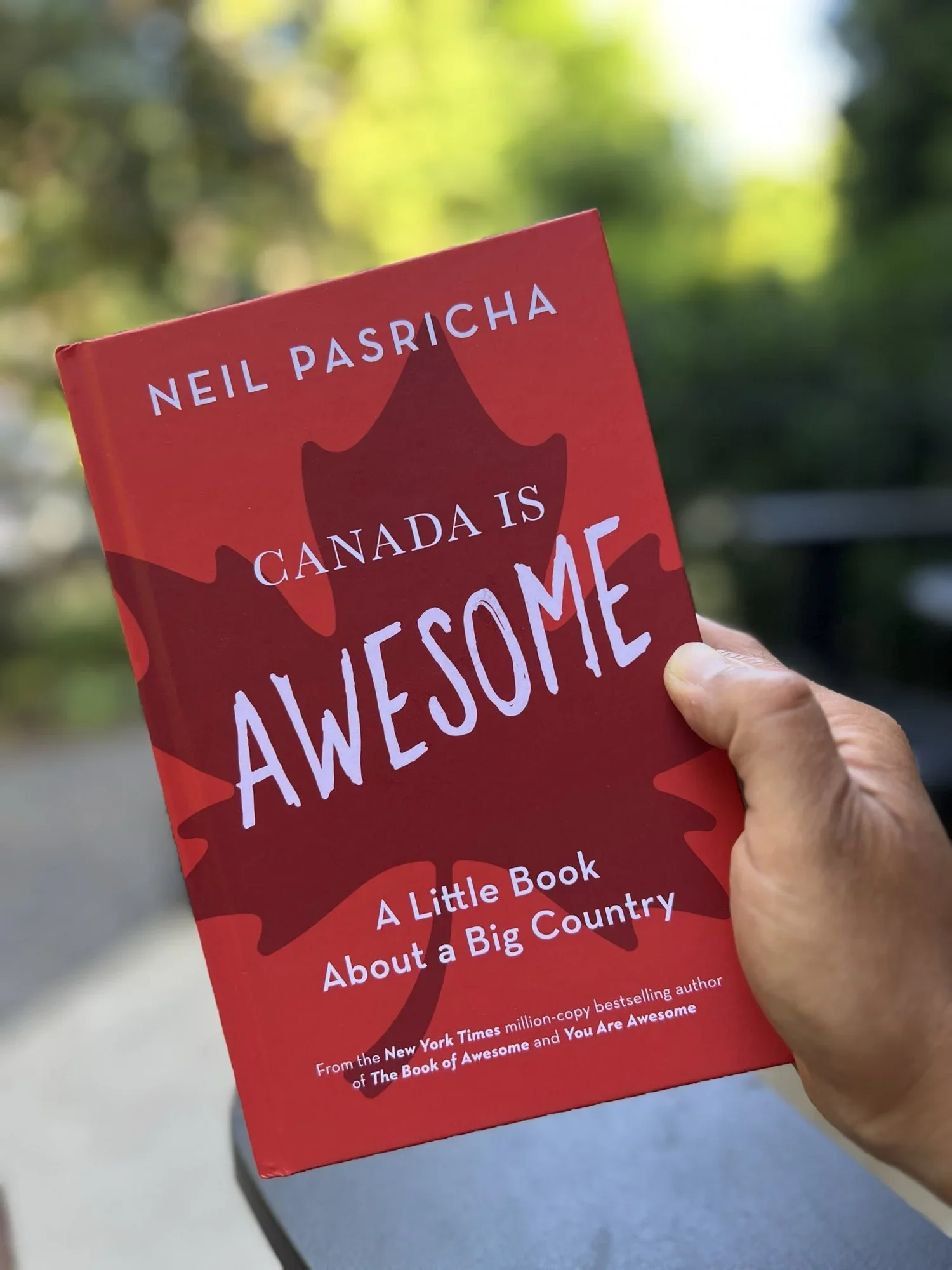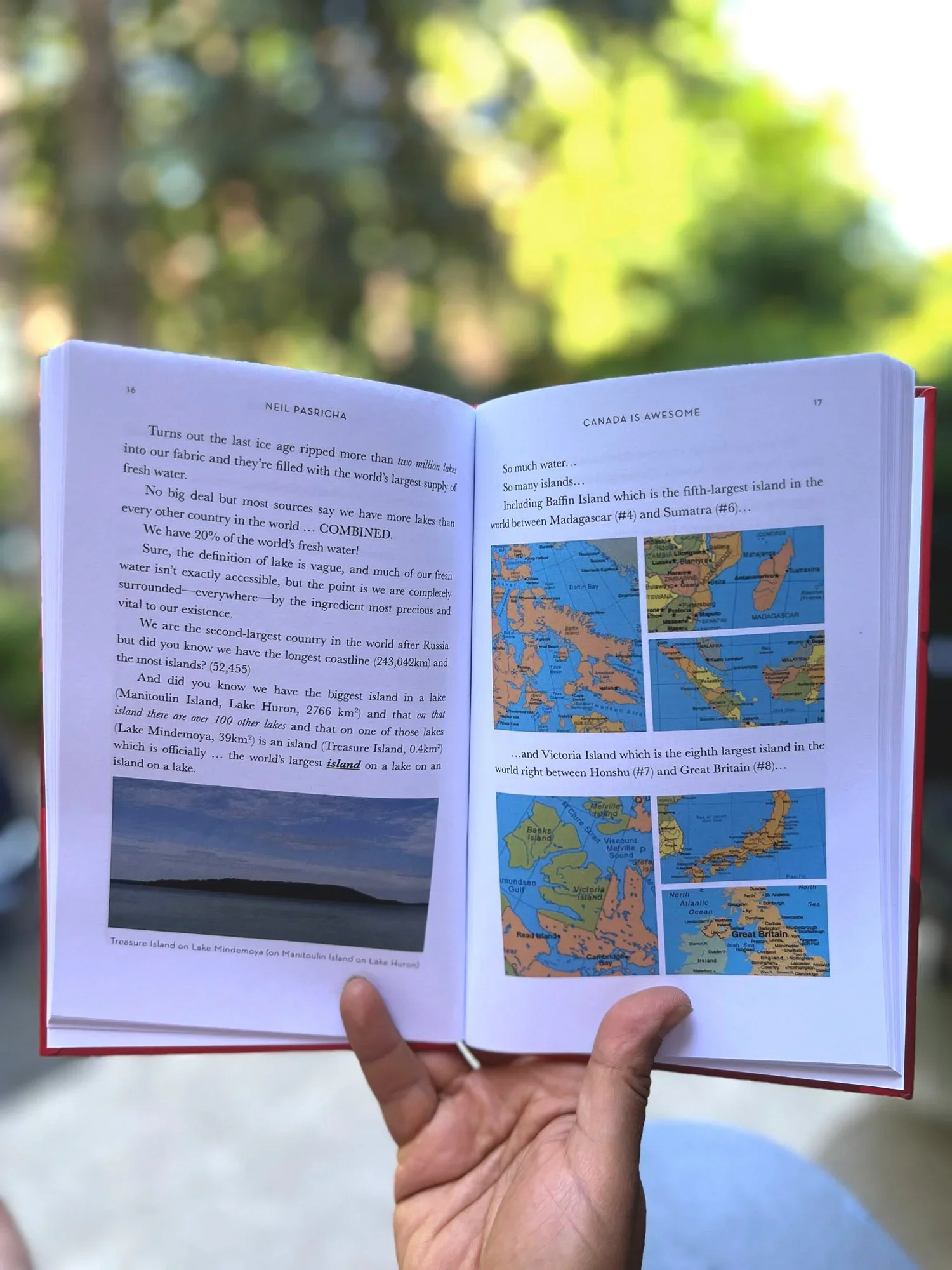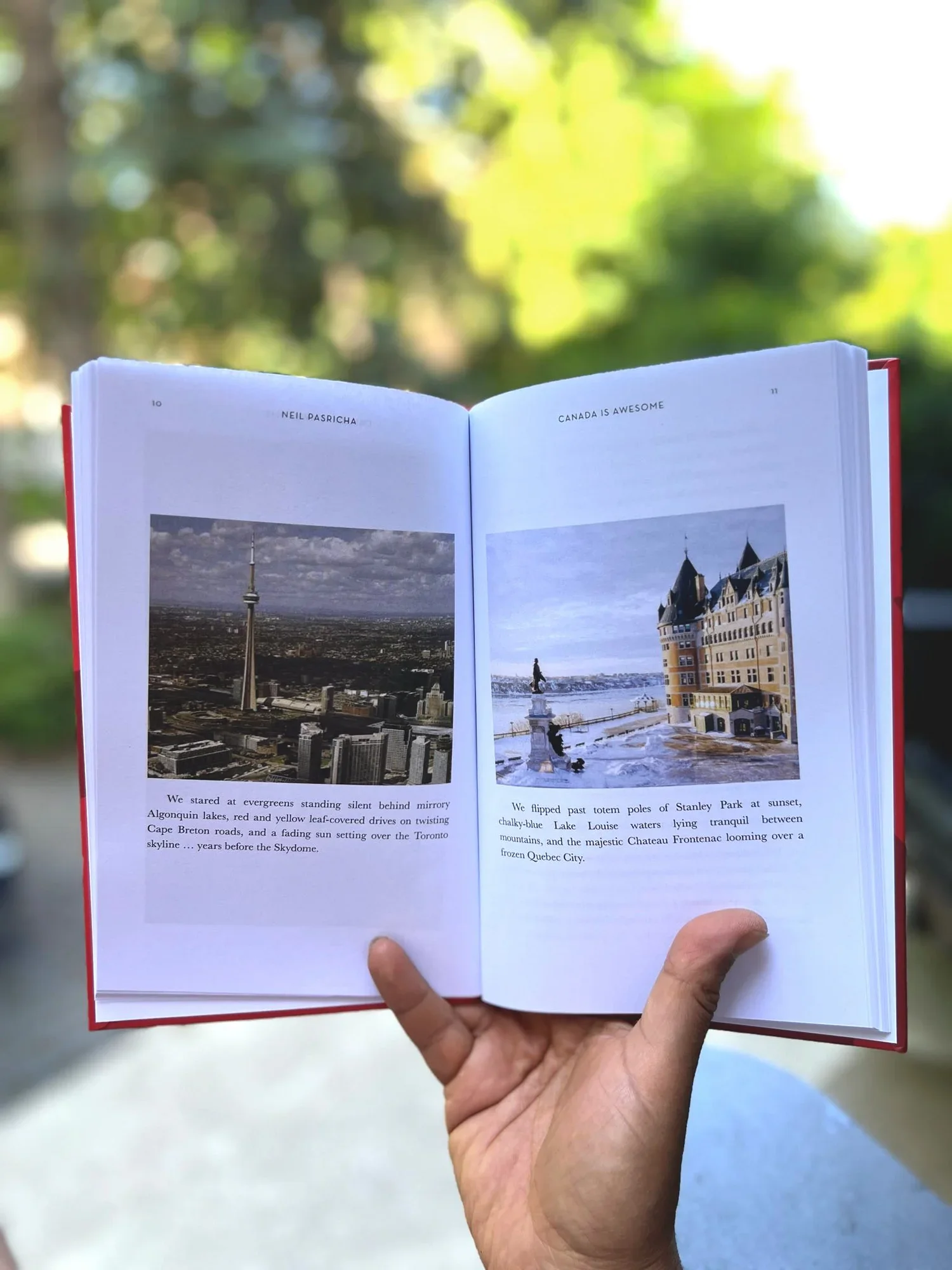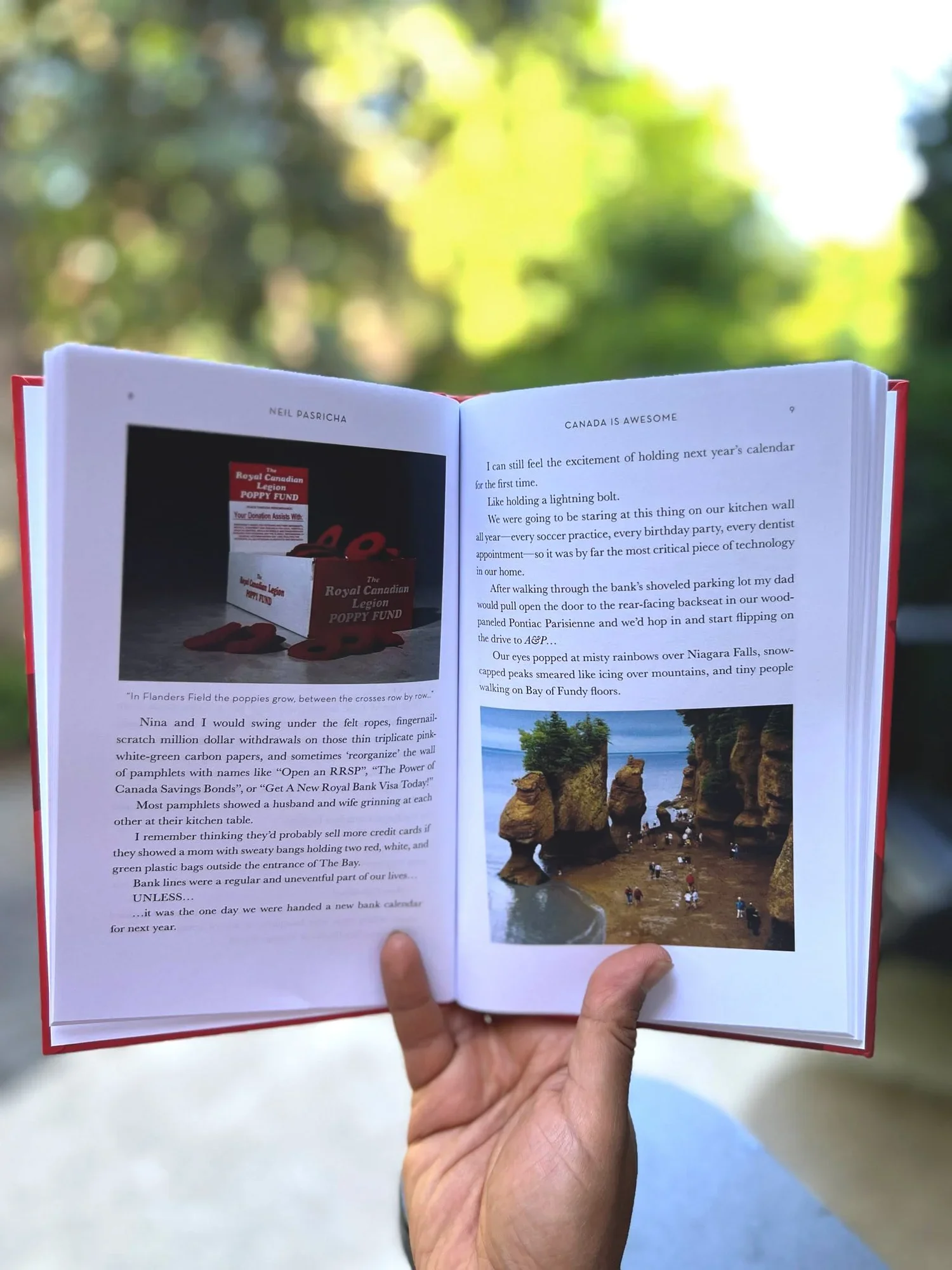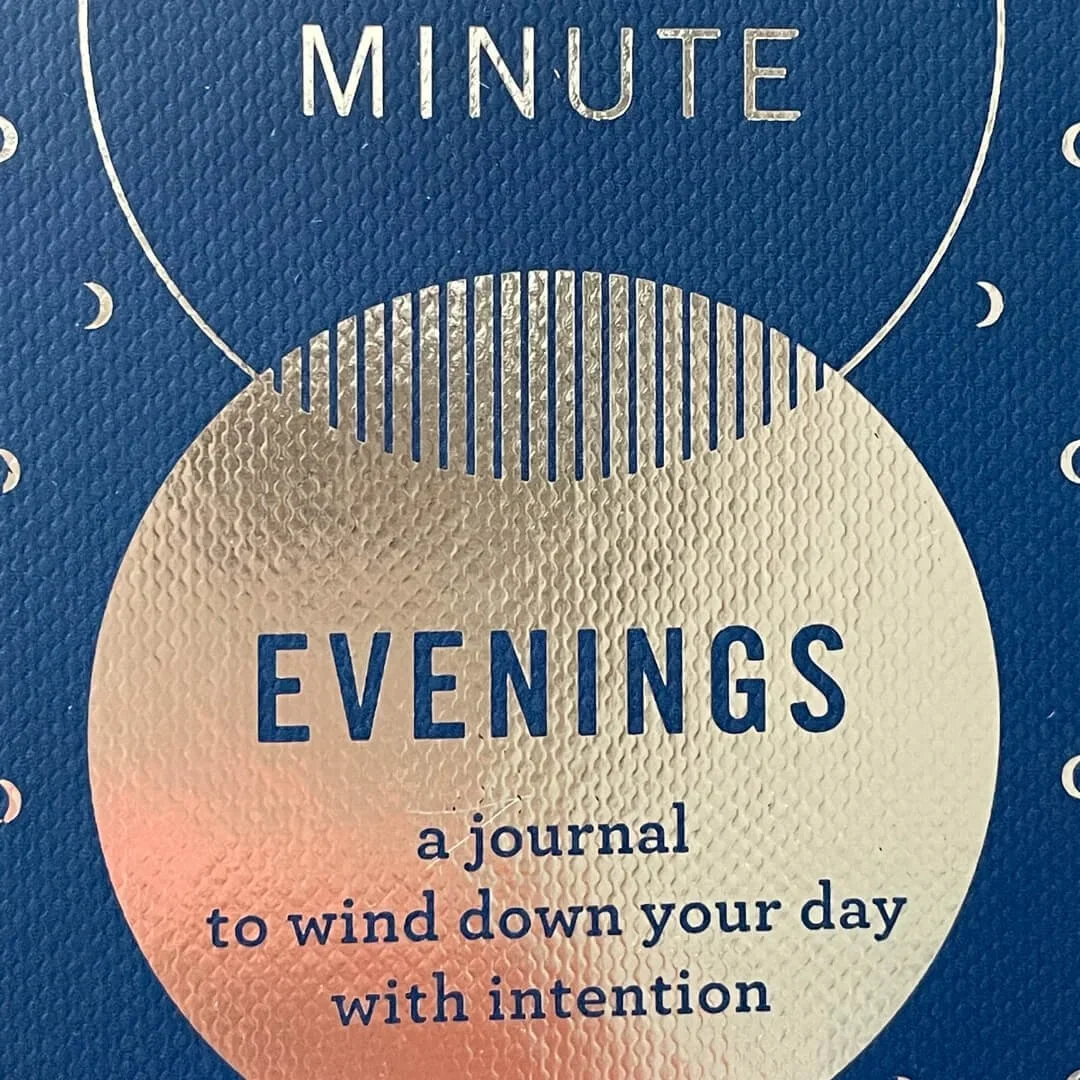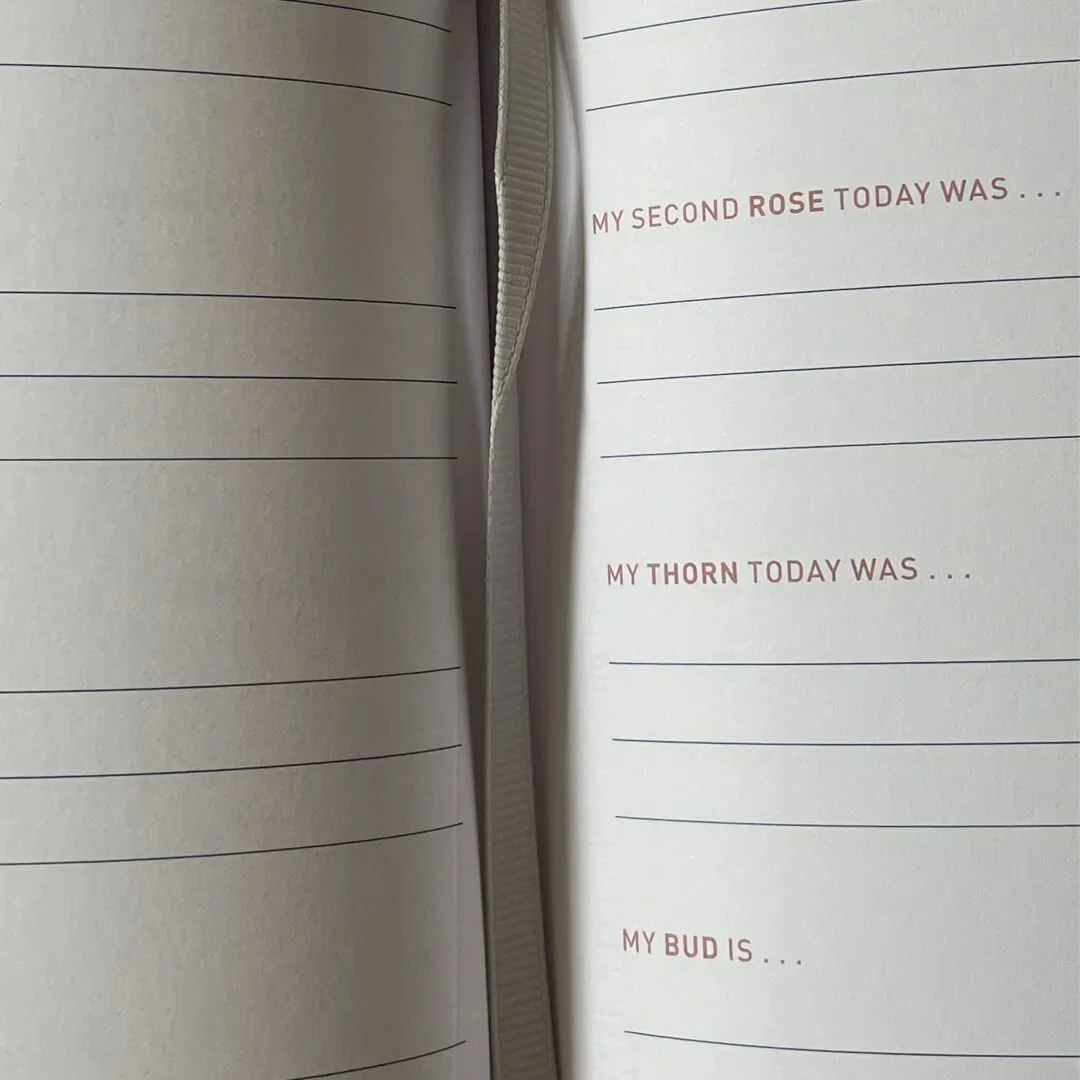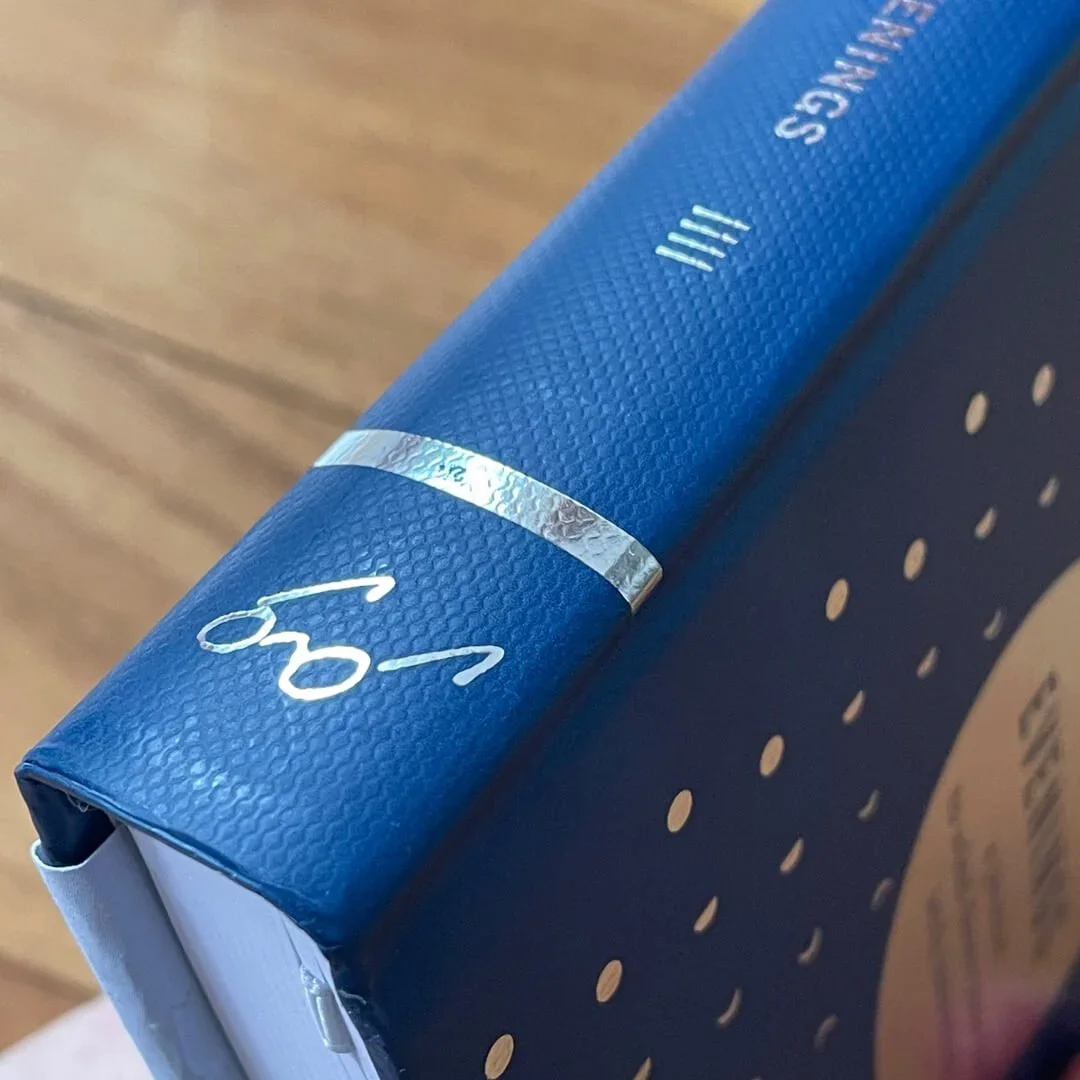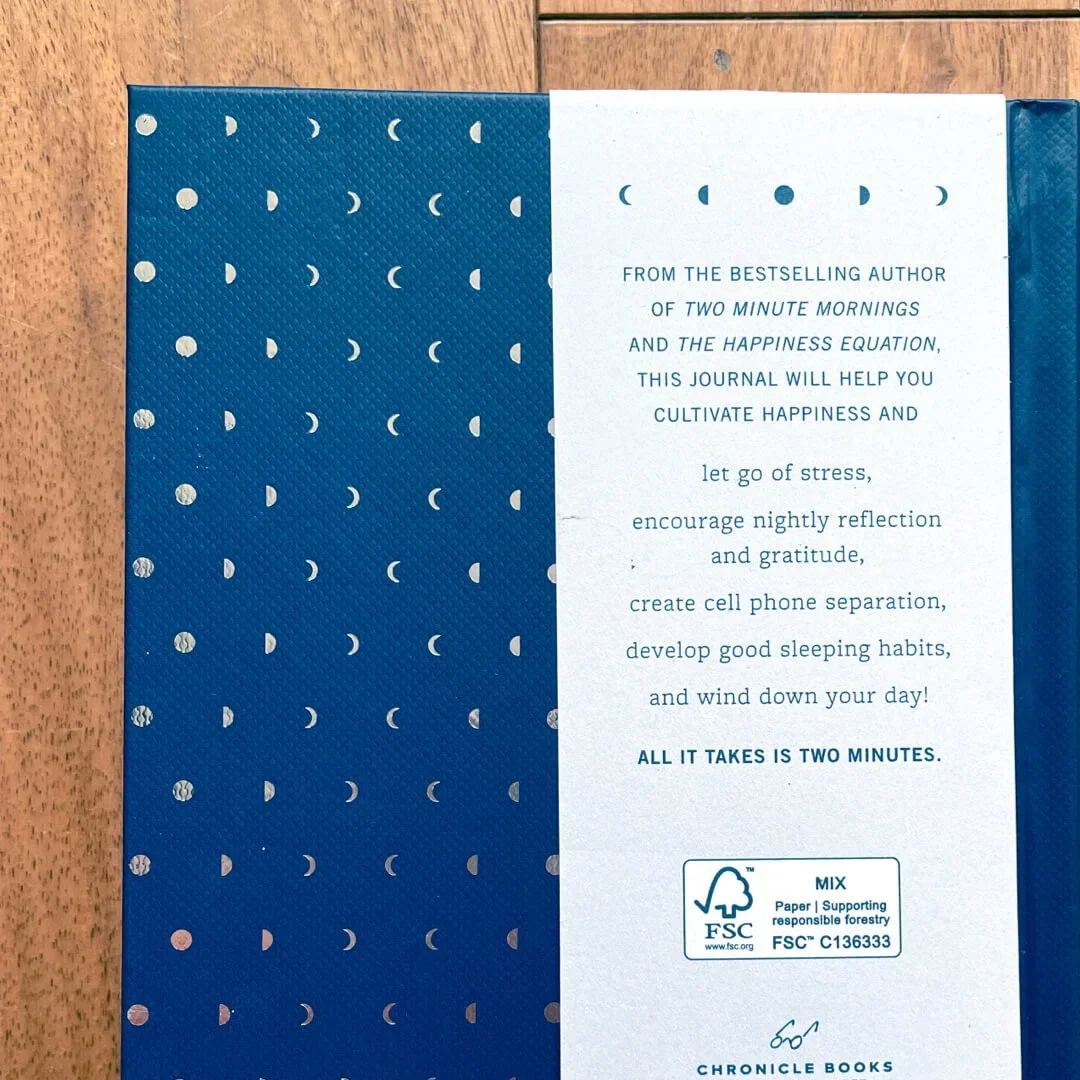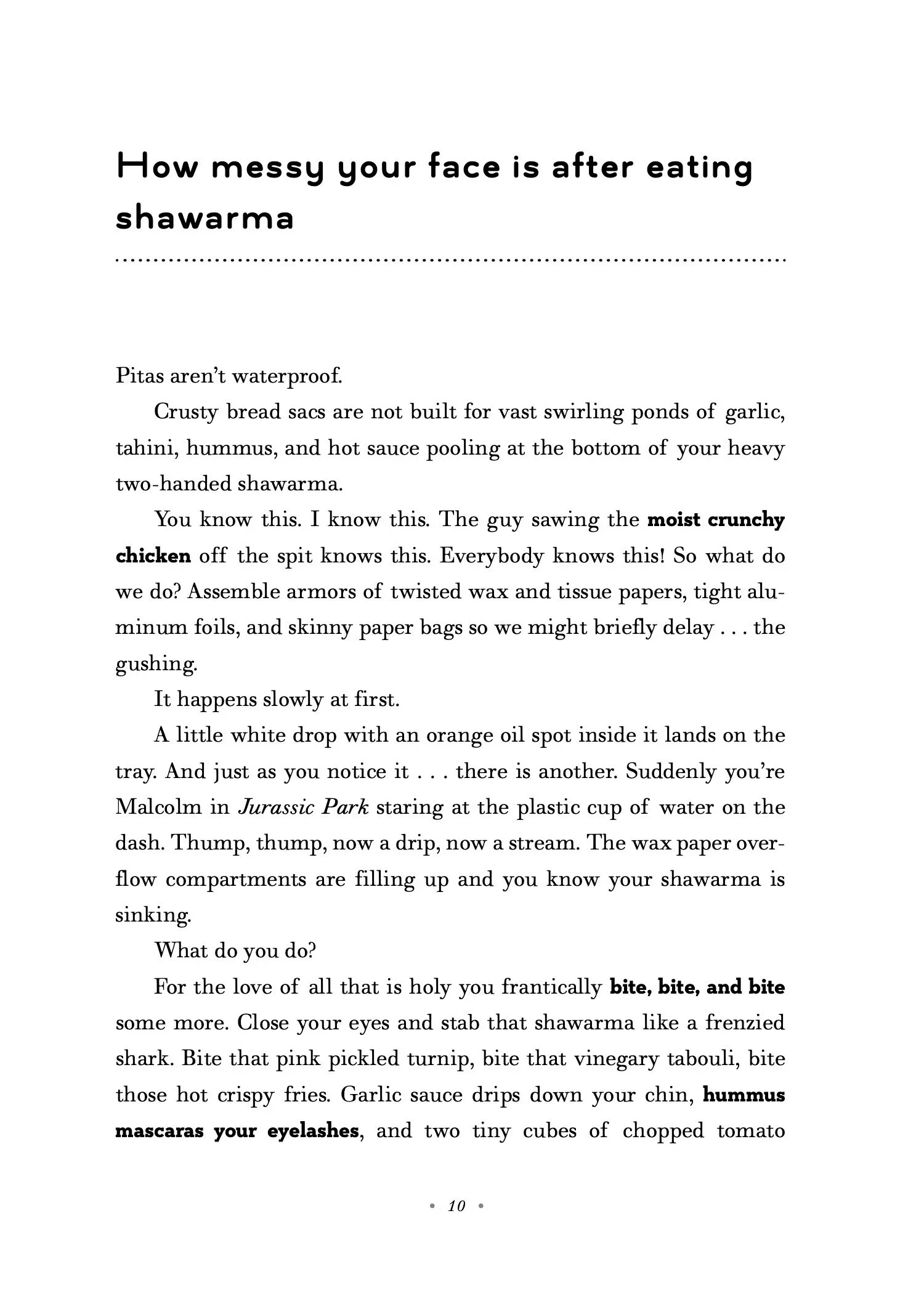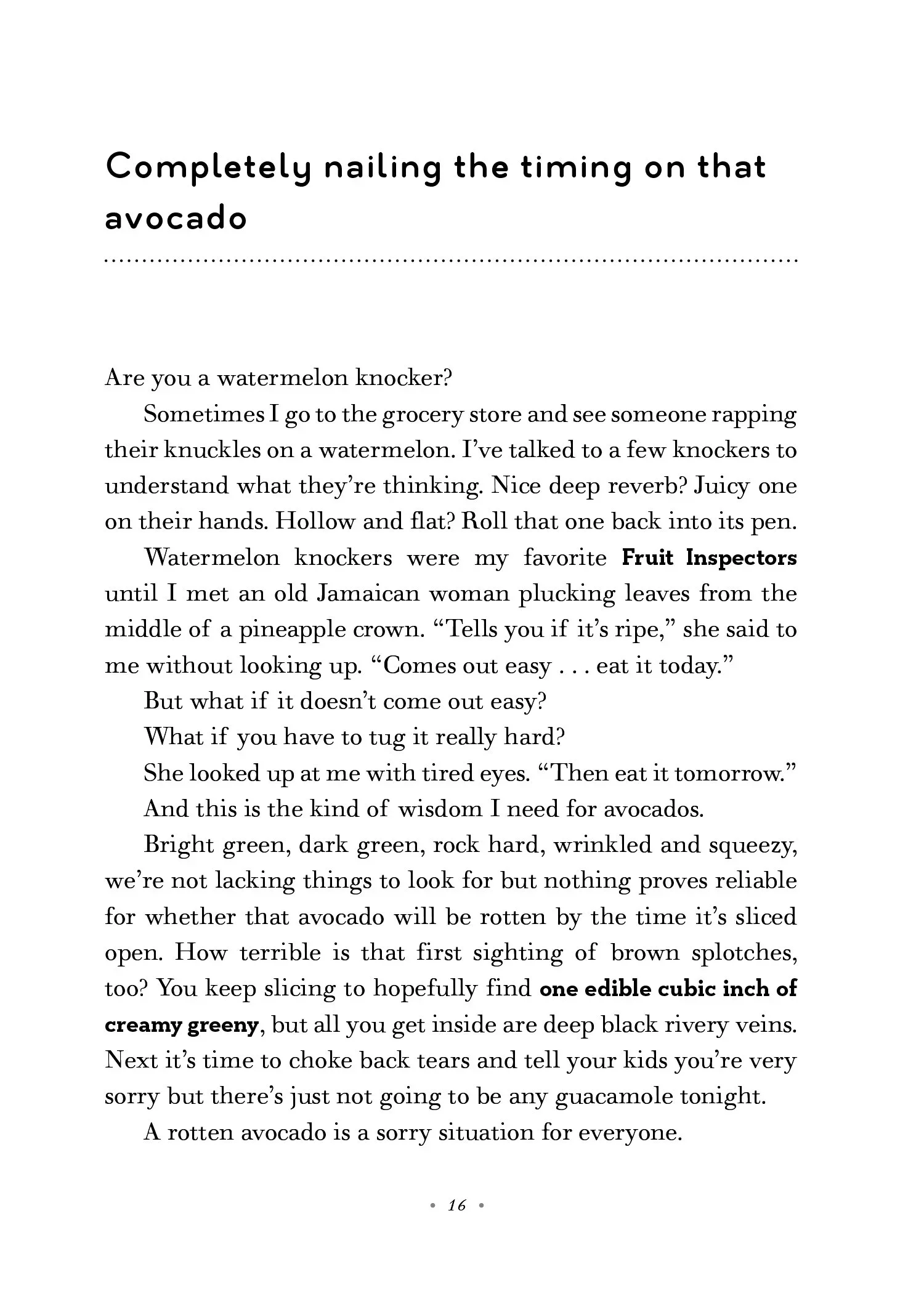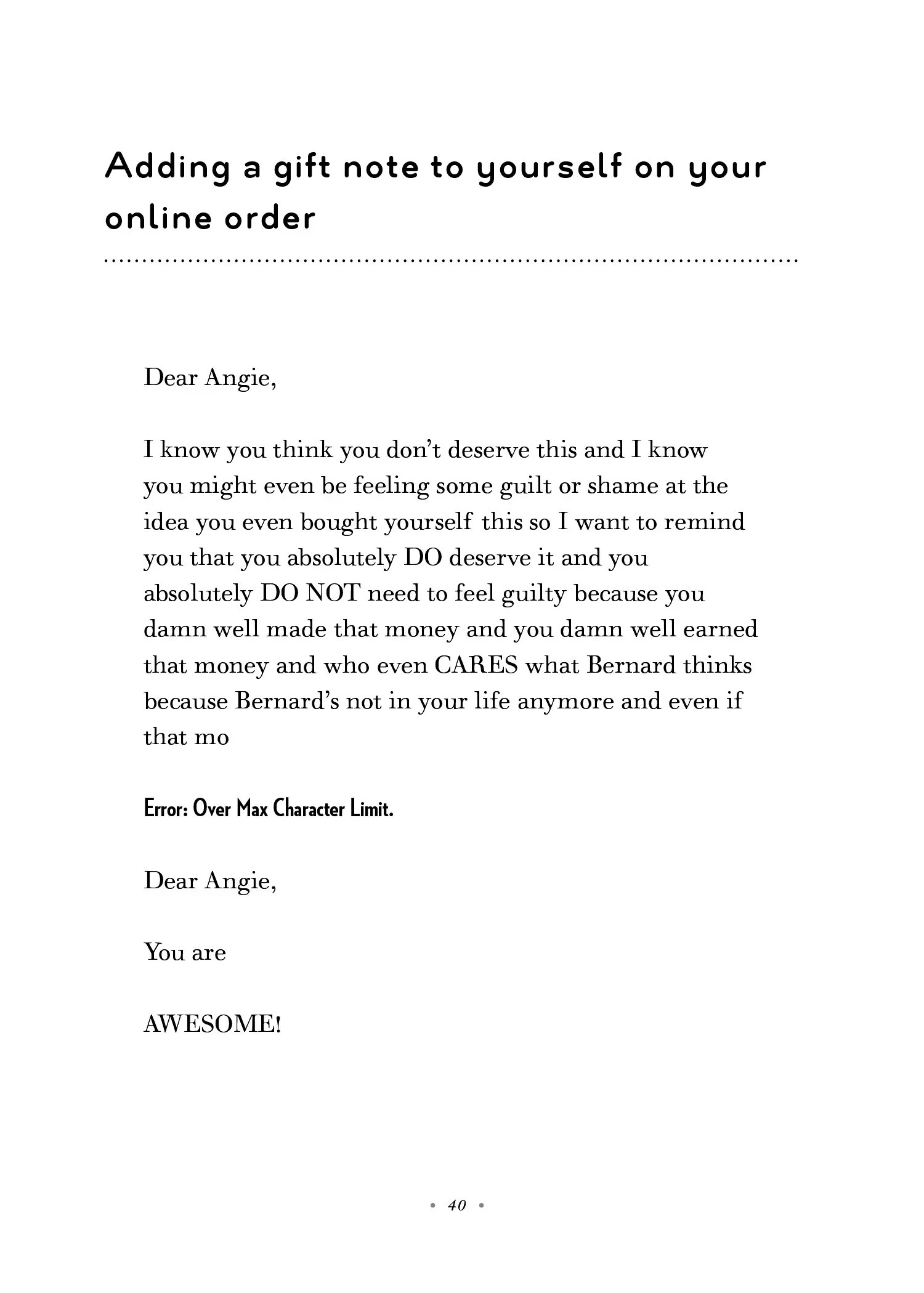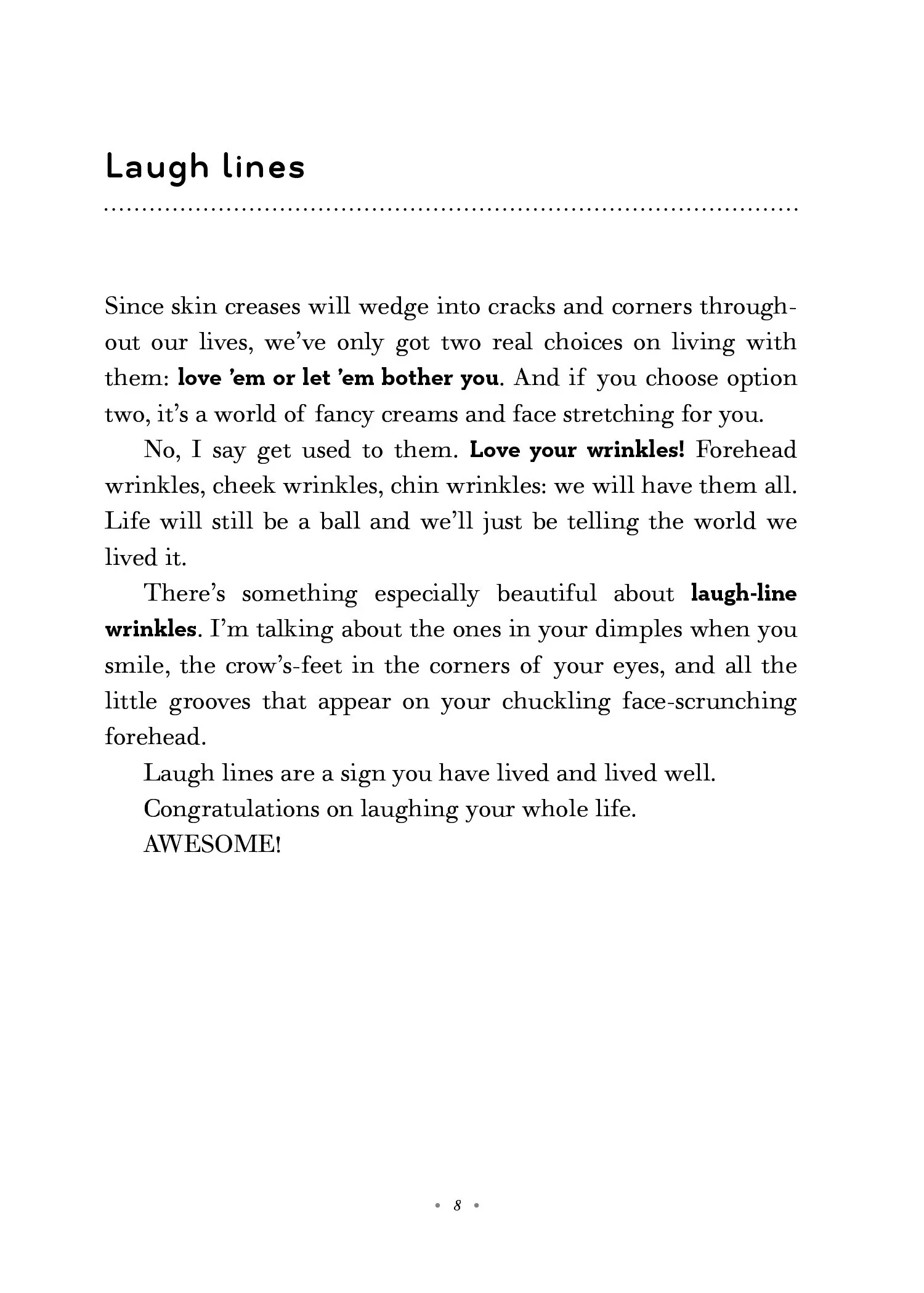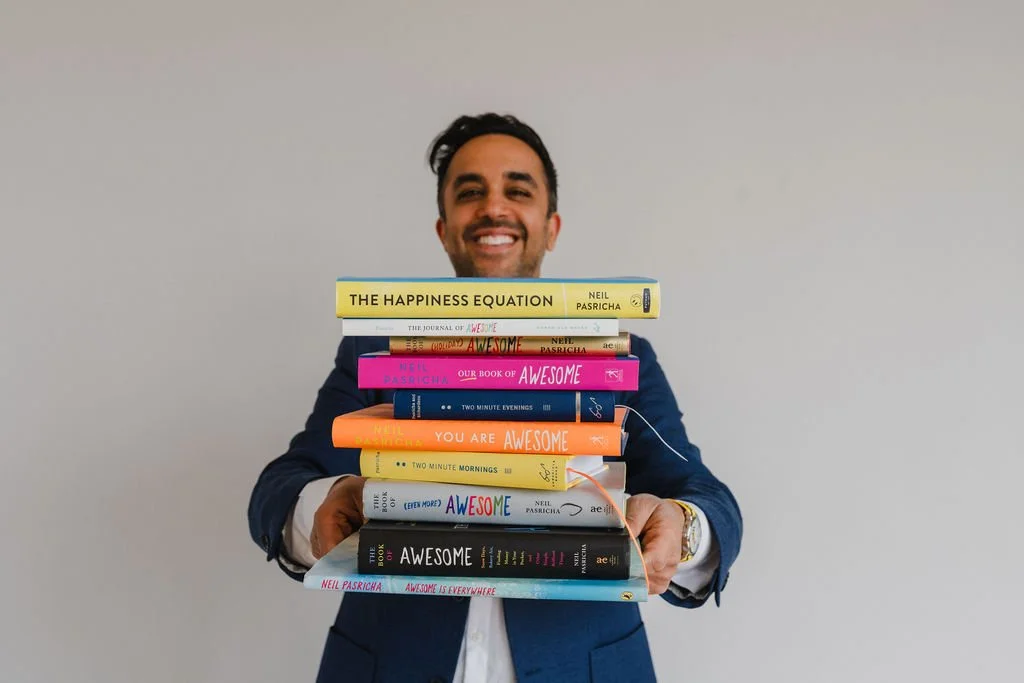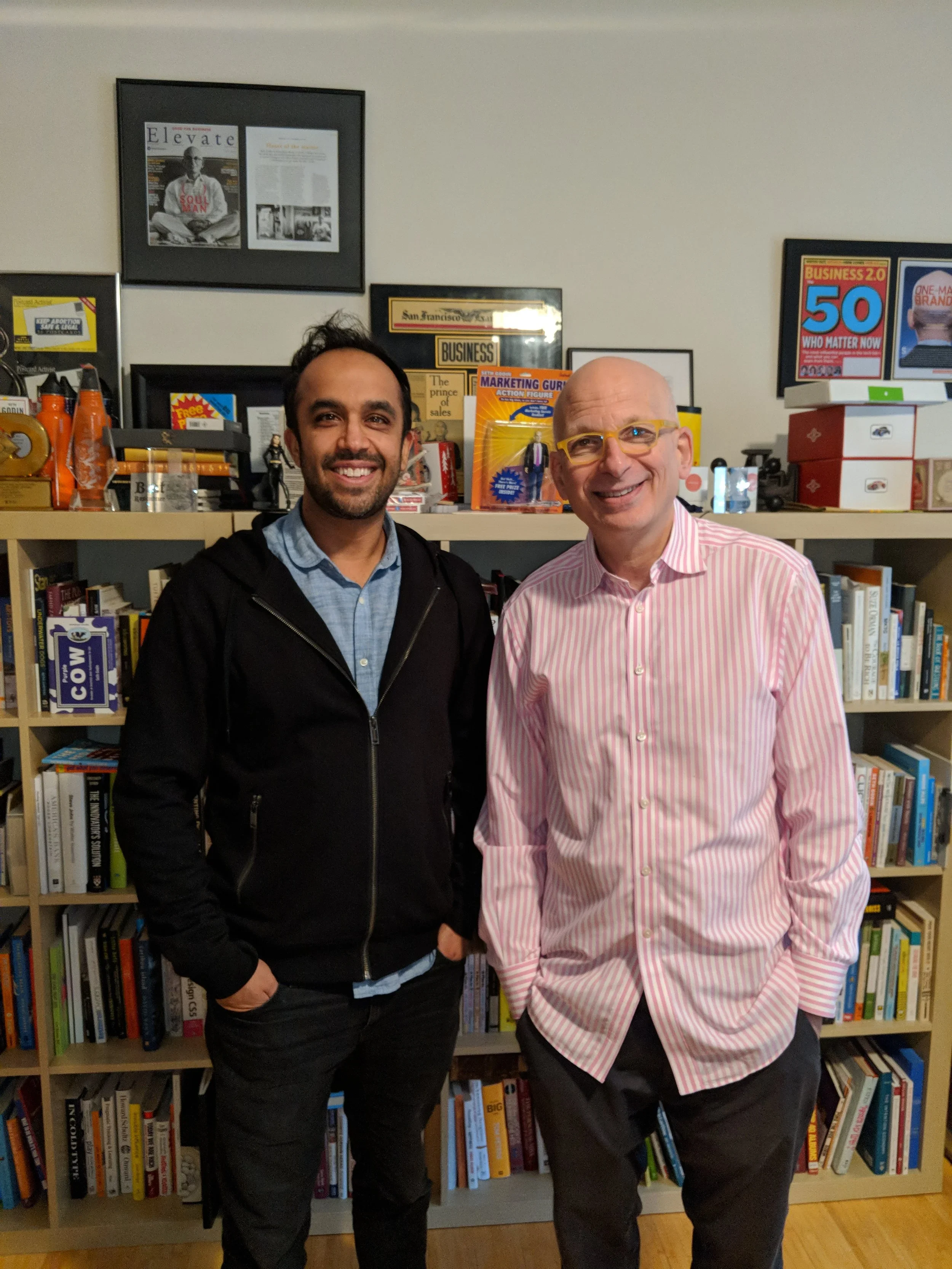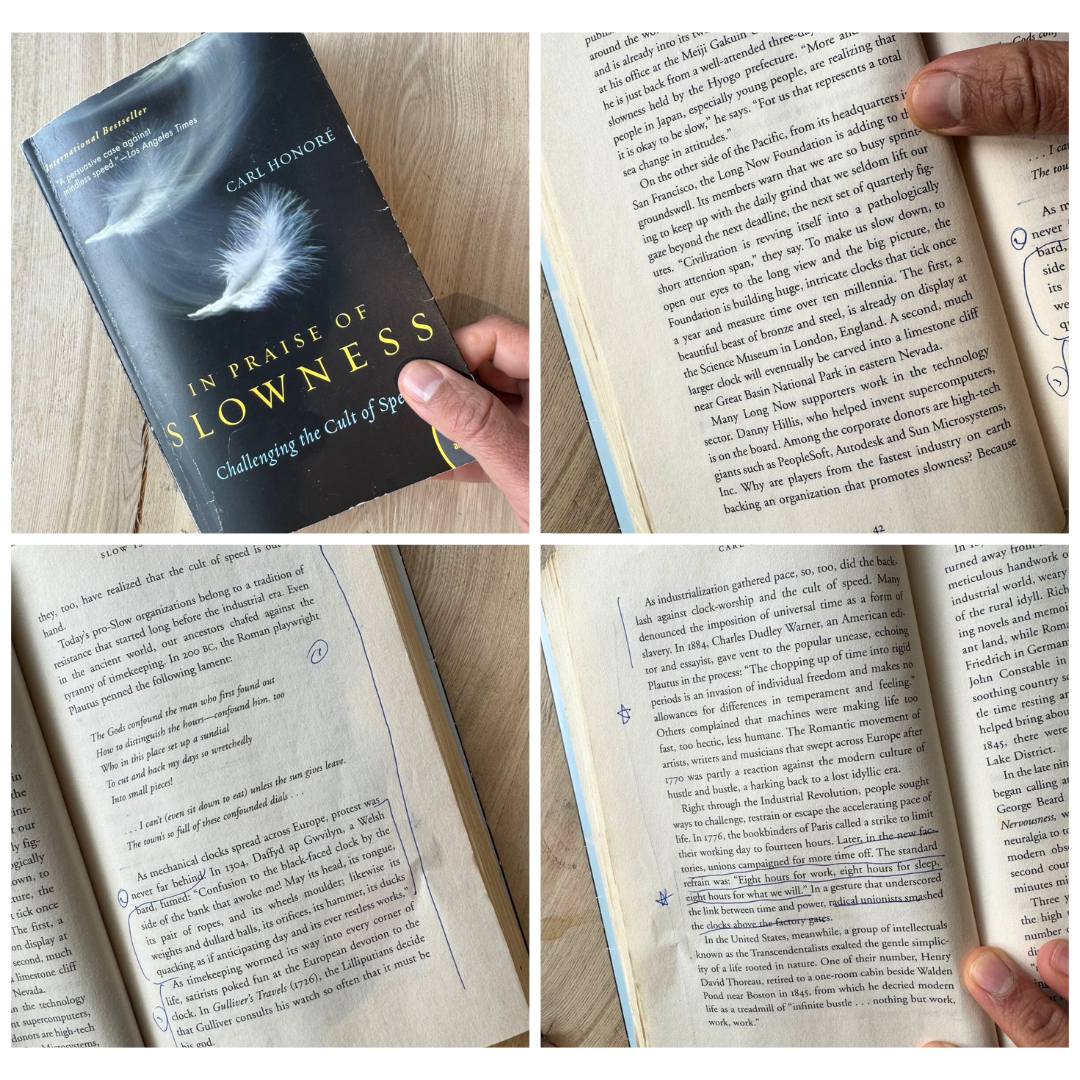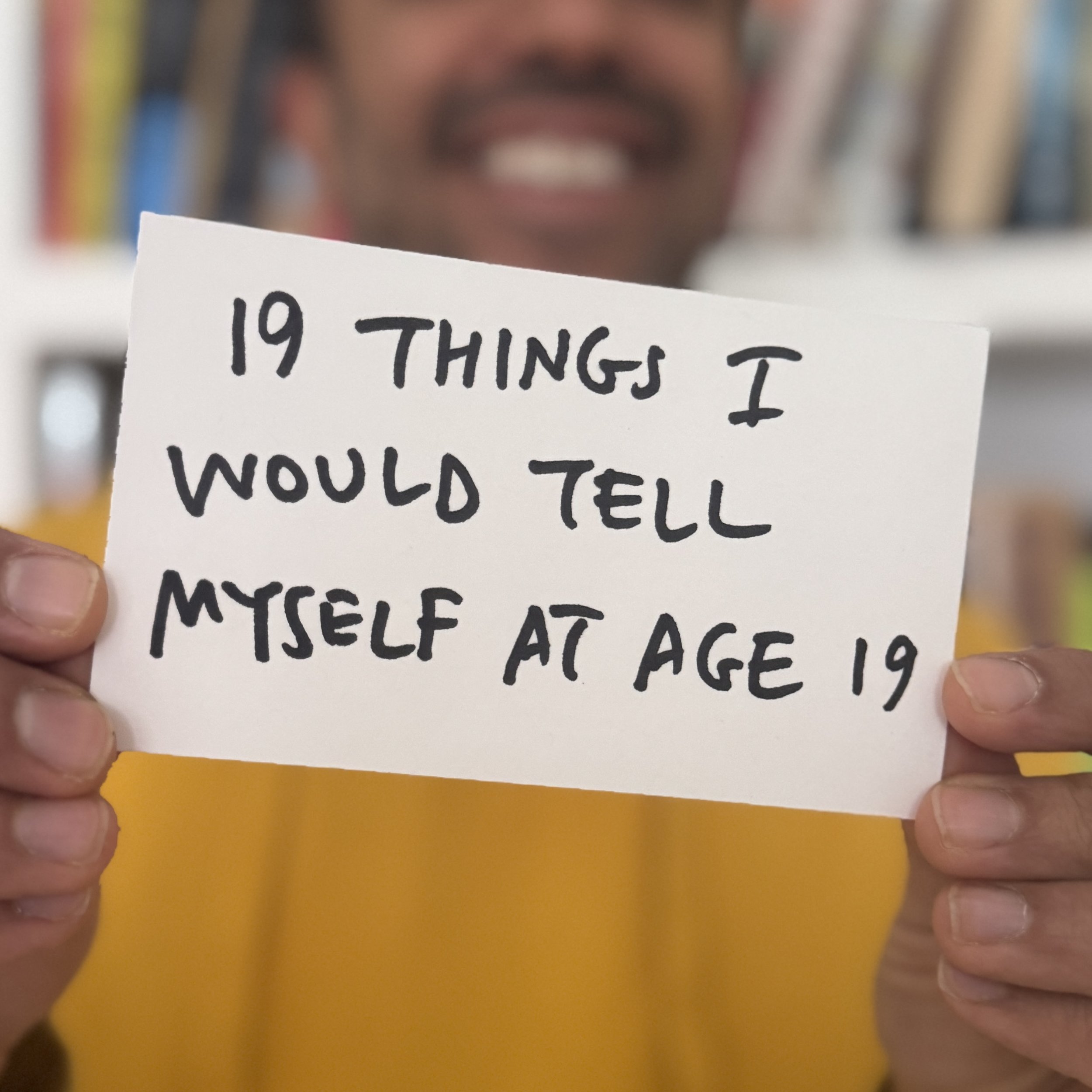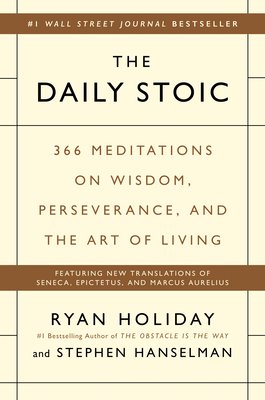Why Gratitude is a Leadership Superpower: My Interview with the Smith School of Business
Hey everyone,
Happy new year!
I was recently interviewed by the Smith School of Business (my alma mater!) about my thoughts on gratitude. I thought I'd share it with you below as a way to refresh some thoughts as we get into the new year.
Neil
Why Gratitude is a Leadership Superpower
Interview by Deborah Aarts
Neil Pasricha, BCom ’02, knows he has plenty to be thankful for. Yes, there’s the highlight-reel career stuff. He has 11 wildly popular books, including 2010’s smash The Book of Awesome, last year’s Our Book of Awesome and, most recently, Canada is Awesome—which have collectively sold more than two million copies and spent more than 200 weeks on bestseller lists. He also has a thriving speaking business that takes him around the world, firing up audiences to live happier, more fulfilling and more resilient professional and personal lives. And then there’s his podcast, which gets him talking to fascinating people (ranging from Seth Godin and Brené Brown to Temple Grandin and Quentin Tarantino) about the books that formed their sense of self.
Pasricha appreciates all of it. But in a phone interview on a sunny fall day, work accomplishments are not what first come to mind when asked what he’s grateful for. Instead, he shares a laundry list of tiny, beautiful wins that have lit up his day: That his seven-year-old woke him up with snuggles. That his wife is finally recovering from a concussion. That he has a square of dark chocolate waiting for him in his backpack. That he is able to have the conversation while going for a walk, which doubles his daily step count, and that the weather is fine enough to allow him to go jacket-free.
Taking note of little things like these might seem frivolous, but in Pasricha’s view, it’s anything but. That’s because he’s studied the science and therefore knows that people who make gratitude a regular, everyday practice are proven to be happier and healthier individuals. They’re also better leaders, prone to building more engaged, resilient and innovative teams.
Indeed, gratitude can be a competitive advantage, even in the cutthroat realm of commerce. That’s why—as Pasricha explains to Smith Business Insight contributor Deborah Aarts—it’s a practice leaders should actively cultivate.
Deborah Aarts: Let’s start by going back in time. What first got you into gratitude?
Neil Pasricha: It was 2008. I was going through the end of my first marriage, around the same time that my best friend—who had attempted suicide once before—ended up taking his own life. I was living in Mississauga, managing leadership development in Walmart’s HR department, and I remember driving home from work one day and thinking, “I need a way to focus on something positive.”
I had always liked to write, and I thought that might be a way in. So I got home, Googled 'how to start a blog' and, about 10 minutes later, set up a little website called 1000awesomethings.com and set a goal to writing about one awesome thing every weekday for 1,000 days.
In the beginning it wasn’t overly positive. I was writing about things like when the cashier opens a new checkout lane for you at the grocery store. But I tapped into something: How great it feels when a little moment of victory happens, even amidst a negative situation. That’s how I started. It’s been nearly 18 years and I still make a point to write one new awesome thing every single day.
Deborah Aarts: How has your understanding of gratitude changed since, as you’ve amassed more and more success?
Neil Pasricha: When the blog finished in 2012, I’d been doing it every day for four years. It had become far more popular than I ever expected and had led to three books. I kind of thought, “mission accomplished.”
But it turns out that you can’t really turn off gratitude once it’s a practice.
The reason is biological. We each have an amygdala in our brains—it’s the oldest part of the brain, preceding our species. It’s about the size of a walnut, and it secretes fight-or-flight hormones all day. The amygdala is a vital part of species survival: It’s why we look at the questions we got wrong when we get a math test back, why we seek out one-star reviews of the item we want to buy on Amazon. Instinctively, we are wired to seek out the negative.
I’ve learned that we really do have to battle this biological, root part of our psyche all the time. It really does have to be a daily practice. You can’t stop. You don’t ever get to a place of being “done” with gratitude.
Deborah Aarts: How does the practice of gratitude square with the world of business and the tendency to constantly seek new, better and bigger ways of doing things? Is gratitude always at odds with modern capitalism? Or can it be complementary?
Neil Pasricha: I don’t disagree that late-stage capitalism can have all kinds of negative externalities. We’re seeing wealth becoming extremely concentrated. We’re seeing so much of our ability to enjoy things become contingent on 10 different sign-ups, 12 different accounts and endless subscription fees. We’re seeing our streets filled with delivery vans. We’re seeing a lot of people whose default mode is “Go, go, go.”
We’re also all exposed to extremely sophisticated, billion-dollar research algorithms that are far smarter than we all are. It’s hard to scroll anything online without coming across anger-producing drips meant to make us upset. It’s happening at a rate that’s faster than what we can process and at a level that is beyond our understanding.
So yes, many parts of modern life make gratitude harder to practice than ever before, but I’d argue that we also have a greater need for it. Furthermore, gratitude is not something that slows you down or gets in the way of accomplishment. In my experience, it can only help you. Even in business.
Deborah Aarts: How so?
Neil Pasricha: Leaders right now have a very challenging set of circumstances. Markets are uncertain, which makes employment feel uncertain for a lot of people. Yet as a leader, your role is to inspire and motivate a team by setting a direction and helping support people towards their goals. You need a workforce that is engaged in their work, and trusting of one another, and that can be hard to create when things feel so uncertain.
But there are real benefits to be reaped if you can show up with positivity at work, even when things feel stressful and overwhelming.
We know from research that when you can help your employees feel grateful for both the work that they’re doing and for the team that they’re part of, the benefits are myriad. Engagement improves. Productivity goes up. People are more likely to feel that what they do is important. Trust goes up among teams, absenteeism goes down, and fewer people look for other jobs. This is all exactly what you want as a leader.
Deborah Aarts: So, is it the job of the leader to model appreciative behaviour?
Neil Pasricha: I think so. I worked at Walmart for 10 years and one of the projects I led was trying to understand how two similarly sized, structured and situated stores had such varying degrees of standards. One store had a completely clean parking lot. The floors were spotless. Everything on the shelves was tidy. The standards were really high. The other store often had garbage in the parking lot, gum on the carpet, shelves that were askew. We did an analysis. Guess what? At the first store, the store manager would often put the carts away, pick up garbage and straighten shelves as they walked by, so everybody else did too. At the other, the manager wouldn’t do those things, so no one else did.
Your work as a leader is observed, mimicked and reflected in the workforce at all times. So if you can be brave and say, “I want to start or finish a meeting with a gratitude exercise,” that behaviour gets reflected throughout the organization. And when people recognize and see one another and show gratitude towards each other, everything gets easier and better for the person leading them.
Deborah Aarts: What are some practices leaders can employ to stoke gratitude in their teams?
Neil Pasricha: One practice I like is to create a “Wall of Awesomes” in the office. You just leave a pile of cards or sticky notes and pens or markers beside it. Encourage people to write down something that they appreciate whenever they feel like it. Maybe they love it when there’s still hot water left in the kettle in the office kitchen. Or when they’re late to a meeting, but their boss is even later. It can and should be organic. But when people start writing things like that down, you end up having this physical manifestation of gratitude in the office atmosphere. It becomes impossible to walk by without seeing some positivity reflected at you.
You can also start a meeting with “Rose, Thorn, Bud,” which is a classic gratitude practice in which people share a success, a challenge and something with potential. As the person leading the meeting, you can stress that there’s no pressure to play, and then start by doing it yourself. It’s not easy. In fact, it can be a bit awkward at first. But if you do that at the beginning, the tenor and the tone of a meeting changes. People become more naturally open, more willing to share, more likely to trust and lean into each other.
Another way is to end a meeting with a round of appreciation. Encourage anybody who feels comfortable doing so to say a thank you to anyone else on the team for something they’ve done. Again, as a leader, you can start, or you can sit in a nice 30-second pause and let it kind of bubble up. The combination of gratitude and recognition can reduce a lot of workplace challenges and open up peoples’ ability to feel more seen and human at work.
Again, it’s not always easy. These little games and activities take courage to initiate. But they do make people feel seen, and they do help our brains to be more positive when it’s not our natural default position.
Deborah Aarts: Can you share a tip to help leaders integrate more gratitude into their own busy lives?
Neil Pasricha: Here’s a simple one: Try to write down tiny and specific things you’re thankful for every day. Not the big things that come to mind first, like your husband, or your kid, or your dog. Instead, something like, for example, that your husband, Antonio, put the toilet seat down, or that your daughter rode her bike without training wheels. Noticing small and specific things lights up area 17 of your visual cortex and creates a specific memory. When you write it down, it lights up area 17 again. And when you read it later, it lights up a third time. Simply writing down small, specific things you appreciate can have a doubling and tripling effect on the positive moments of your day.
Deborah Aarts: As someone who’s now been practicing gratitude for the better part of two decades: Does it get easier with time?
Neil Pasricha: In my experience, yes. Gratitude becomes a bit like a large sun in your mental solar system. I have days that I’m unhappy, that’s for sure. But if you actively seek out things to be grateful for, it becomes easier to find them. And the more you look, the more you see.
I talk about gratitude a lot! Here is some more detail on gratitude and a few 1000 things to be grateful for.
A gift guide to my books
Hey everyone,
Anyone else been mainlining Phil Spector's Christmas?
I have it in a cracked jewel case on CD and it's been splitting time in our van lately with some Blue Jays talk radio and the very occasional moment of absolute, perfect silence.
For those interested in which of my books I recommend here's a quick gift guide.
My books and journals focus on happiness, gratitude, resilience, habits, and community, and they've sold over two million copies and been on bestseller lists for over 200 weeks. Don't take my word! There are over 35,000 reviews on Amazon and GoodReads.
Here they are from newest to oldest with a Perfect for under each one...
Neil
A Gift Guide to Neil Pasricha's Books
1. CANADA IS AWESOME (2025, KDP)
My home country has been big news this year since Trump said he was gonna annex us, after he said he would annex Greenland, before he said he would annex Panama. It felt like a good time to expand my little 5000-word 2017 'Canada Is Awesome' audiobook into a fresh 10,000 word essay. I posted it online for free (HTML, PDF, Audiobook, YT) and decided to Amazon self-publish it into stocking stuffers, sold at cost. It's a small book! 78 pages. Takes maybe an hour to read. Paperback is on Prime for $7.99 USD/$8.67 CAD but I do recommend the full-colour hardcover if you can swing it for $19.99 USD or $28.04 CAD. Full book details here and you can buy it on Amazon.ca, Amazon.com, or your local Amazon. (Books are at cost so if you'd like your local indie to carry it—just ask them!). Hardcover pics below, just click to zoom in.
Perfect for: Canadians, Canadian friends, Canadian neighbours, Canadian allies, & anybody who loves poutine...
2. TWO-MINUTE EVENINGS (2024, Chronicle)
The best gratitude game ever is Rose, Rose, Thorn, Bud. Simple! Short. Easy. At least a few days a week we play it with the kids around the kitchen table, sometimes Leslie and I play while brushing our teeth or before turning off the light. And when I'm traveling I do the practice solo in this journal. What is it? Simple. What was your Rose of the day? A highlight, gratitude, just one good thing that happened. "It was pizza day.", "I climbed the baseball fence to got the tennis ball.", "I got permission to take the Grade 8's to a play." Then: What's your second Rose? What's one more good thing that happened? "Max can come to my birthday.", "I got to interview someone whose books I've loved for a long time.", “I had time between kid drop off and getting to work to stop and get a warm tea.”, “Neil filled the car with gas for me.” Then a Thorn! What's one thing that didn't go well? A chance to vent, receive empathy. "I had 10 things to do today and I only did 1.", "I didn't make the volleyball team.", "I got into a fight with my dad." Share anything. No judgment. And no telling people what to do. Just listen! Finally, a Bud! What's one thing you're looking forward to? Great place to end because research shows looking forward to anything ... makes you happier. "Anticipation for future confers great benefits to human well-being and mental health." Leslie and I made 'Two Minute Evenings' to put this gratitude game into physical being—which helps us practice it. Like I said, I've got one in my suitcase and we have one at our bedside table, too. Buy it from Chronicle, Indigo, Amazon.ca, Amazon.com or your local Amazon. (Or if you're buying 25+ copies get a bulk discount here.)
Perfect for: anyone who gets into bed still thinking about their to-do list, people who want a calm nighttime ritual but don’t have time for a long routine, and anyone who loves ending the day with a pen and paper instead of a screen...
3. OUR BOOK OF AWESOME (2022, Simon & Schuster)
This book is a celebration of this community. I started putting it together in 2020 exactly ten years after 'The Book of Awesome'—the first one!—came out. This is the fourth and final one. Hundreds of new awesome things, 80% are written by me, 20% written by the community, with 100s of more comments, letters, and one-offs stitched in for a "back of the bus bumping through town" type of cacophony. The book speeds up and then finishes in a triumphant awesome climax. Buy it on Amazon, B&N, Bookshop, Indigo, or, if you're buying 25+ copies for a team or group, get a bulk discount here.
Perfect for: elementary school teachers, managers who want to open or close team meetings by flipping to a gratitude, bathroom readers, and, of course, hardcore fans of 'The Book of Awesome' who want the newest one....
Here are a few sample pages:
4. THE RESILIENCE EQUATION: How to Navigate Change, Wrestle With Failure, and Live an Intentional Life (2019, Simon & Schuster)
I wish this book was called 'The Resilience Equation' so that's what I'm calling it! I realize the cover still says 'You Are Awesome', but what are you going to do? Full disclosure: I did ask the good folks at Simon & Schuster if we could change it and they politely said ... no. I get it! That would be confusing. But it's confusing already because this is not at all a book of awesome things and despite what Amazon says this is not at all "book 4 of 4 in the AWESOME series." Let me set the record straight: This is my book on resilience. How to develop resilience as a skill—as a muscle. The book is 9 longform chapters combining research, memoir, self-talk, and habits like "Add A Dot-Dot-Dot", "Tell Yourself A Different Story", and "Untouchable Days." It's the book I wrote after 'The Happiness Equation' and has a similar 9-step guidebook structure. It's my favourite book I've written and the one I'm proudest of. Buy it on Amazon, B&N, Bookshop, Indigo, or Walmart. (Or if you're buying 25+ copies get a bulk discount here.)
Perfect for: anyone going through personal change or a recent flop or just having a rough go, corporate folks looking for a new shape or direction in their careers, people who read 'The Happiness Equation' and want "the follow up"...
5. TWO-MINUTE MORNINGS (2017, Chronicle Books)
This is the most popular journal I've ever written and every single page is just 3 simple science-backed prompts:
I will let go of...
I am grateful for...
I will focus on...
I wrote this Harvard Business Review article about the journal's origin and then HBR made it into this YouTube video with a hilarious graphic of me where my beard is gigantic and I got into a car accident? LOL.
Anyway, the journal has sold a lot because it works. It's a quick and easy therapeutic morning intervention to prime the brain to look for the positive throughout the day. What's the benefit? A positive mindset results in 31% higher productivity, 37% higher sales, 3x more creativity, 48% closer relationships, stronger marriages, and even a longer lifespan. I say: Move the phone off your bedside table or (better yet) out of the bedroom completely and when you first open your eyes—when you're in that precious liminal state migrating from your subconscious to your conscious—start your day by centering and grounding yourself before jumping into the onslaught. Click here to buy on Chronicle, Amazon.ca, Amazon.com or your local Amazon. (Or if you're buying 25+ copies get a bulk discount here.)
Perfect for: anyone looking to mentally reset in 2025, people who want to begin a journaling practice but feel too busy, anyone who's always wanted to have a book with one of those ribbony-bookmark things hanging out of it...
Here are a few sample pages:
6. THE HAPPINESS EQUATION (2016, Penguin)
Leslie told me she was pregnant on the flight home from our honeymoon and I spent the majority of the next nine months writing a 300-page letter to my unborn son on how to live a happy life. Inside are big, practical ideas like be happy first (not after you hit the goal), do it for you (not for them), and never retire from what you love, plus tools to help with everything from making decisions to managing time and expectations. It’s part love letter, part playbook for building a life that actually feels good on the inside, not just impressive on the outside. Click here to buy on Indigo, B&N or Amazon. (Or if you're buying 25+ copies get a bulk discount here.)
Perfect for: leaders and aspiring leaders of teams, college students dealing with anxiety or overwhelm, anyone working a corporate job as I was working a very corporate job when I wrote it...
7. AWESOME IS EVERYWHERE (2015, Penguin)
This is my picture book which is stated for ages 2-5 but really offers anyone a simple three-minute introduction to guided meditation. You start by looking at the earth from outer space and then 'tap' to keep zooming in ... until you're eventually staring at grains of sand, flipping the book over your head to dip under water, and zooming back out of again. I was inspired by my own children's love of books like 'Press Here'. Comes in a big (expensive) vivid picture-book format with a mirror in the back and a (cheaper) board-book format. You can watch the trailer here. Click here to buy on Indigo, B&N or Amazon. (Or if you're buying 25+ copies get a bulk discount here.)
Perfect for: new babies or grandbabies, elementary school teachers (Leslie wrote a teacher's guide!), anybody looking for a simple introduction to gratitude and guided meditation...
8. THE BOOK OF (HOLIDAY) AWESOME (2011, Penguin)
Funny story: I'd say one in ten people tell me this is their favorite of my books. It was in print for five years and was on bestseller lists every week in December for each of those five years. But the other 11 months? Moth balls. The publisher said they couldn't keep a book in print that only sells one month a year so they remaindered it. Now this book floats through the universe like some kind of ivory-billed woodpecker. Click here to buy on Indigo or Amazon.
Perfect for: holiday superfans, hosts and hostesses, families who love reading a page or two aloud together, teachers or coworkers you want to thank with something small but meaningful, and anyone who secretly loves the season…
9. THE BOOK OF (EVEN MORE) AWESOME (2011, Penguin)
This is the “you finished the first one and wanted another” book. The is the second 400-page pile of everyday delights. Pulling a weed and getting all the roots with it. When your windshield wipers match the beat of the song you're listening to. When the person you're meeting is even later than you are. Get it from your local indie, Amazon, B&N, Bookshop, or Indigo. (Or if you're buying 25+ copies get a bulk discount here.)
Perfect for: people who want a pile of awesome things around, hosts and coworkers impossible to shop for, teens who are “not really readers"...
10. THE BOOK OF AWESOME (2010, Penguin)
This is my first book: A 400-page collection of hundreds of awesome things. Old, dangerous playground equipment. Fixing electronics by smacking them. Peeling an orange in one shot. All expanded into 1-3 page essays. Backstory: In my late 20s I lost my marriage and best friend in quick succession and started a daily blog to try to focus on the positive over at 1000 Awesome Things. This book is basically the blog ... printed out and stapled together. With a bunch of new ones, too. Get it from Amazon, Bookshop, Indigo, B&N or Walmart. (Or if you're buying 25+ copies get a bulk discount here.)
Perfect for: busy parents who only have a minute here or there, anybody looking to end the day with a daily affirmation before bed, and teachers looking to create their own book of awesome with their students...
If you'd like other suggestions on gifts check out my monthly book club (books are the best gift!) or my older unconventional gift guide.
Why we let sports break our hearts
Hey everyone,
The Blue Jays were two outs away from winning their first World Series in 32 years on Saturday night.
I was 14 when the last one happened and I stood there, in the upper deck, now age 46, my face painted blue and white, screaming myself hoarse after every strike, hoping I wouldn't have to wait 32 more...
But it was not to be.
The Dodgers tied it up and despite loading the bases in the bottom of the ninth there was a combined minuscule base running gaffe ("If IKF ran through!"), a potentially-inconclusive video replay ("Was the foot down?"), a wild outfielder-clanging catch at the wall and ... a couple innings later it was gone.
I sat in that stadium ... frozen ... for an hour. I was so far away I couldn't hear anything happening on the field but I could see it. In mute. Confetti. Broadcaster scrums. Dodgers' kids running around and doing cartwheels. I've been in a mild depression since. I have been scrolling till the wee hours — watching this and this and this and this and this and this and a hundred others — and felt the echoing waves of all the emotions I felt through my childhood ... that 162-beat strum in the background with Tom and Jerry every summer.
I even got to the point where I printed out the only-a-couple-week-old on-the-field team photo and supersized it into four slides in Powerpoint and then printed and pasted it up on my kitchen wall.
That's how I want to remember it.
I want to feel the pains and the cracks and the tears and the squeezes but when I look back I hope I remember the good times.
And whether it's baseball or football or hockey or whatever we do it to ourselves, letting sports into our hearts, where we know we could get hurt, where we know we most likely will, and yet we do it again and again and again.
Why? So many reasons. There is a social form of Durkheim's 'collective effervescence' we likely feel—that vital communal glue Barbara Ehrenreich so eloquently wrote about in 'Dancing In The Streets' (6/2023). I felt that. I mean, the mood in Toronto was just unbelievable for a month straight ... kids playing baseball in all the parks ... shouting 'Go Jays!' to everyone, everywhere, on the streets ... the buses and trains all flashing 'Go Jays!' ... the mood in the country ... with our shared joy and our shared pain. (Cathal Kelly painted a portrait of it well...)
This was a special team. A uniquely tight team. And we felt part of that tightness. Just listen to Ernie Clement in the aftermath. ("I thought I was done with the tears but ... I just love these guys so much.") Or, if you're still feeling it days later like I am, listen to this "Deep Left Field" podcast with a heart-twisting collection of interviews put together by Mike Wilner—here it is on Apple or Spotify.
Ten years ago exactly I had finally let my heart open back up to the Blue Jays when, maybe inevitably, it got broken again. At the time I wrote this article for Macleans, our largest national magazine, and I called it "Love isn't about expectation: An ode to the 2015 Toronto Blue Jays."
I still agree with that.
Love is layered, it is nuanced, it is big, it is whole. Baseball blooms when the weather warms and hibernates when it gets cold. And in that shared spirit of love I want to share another baseball essay with you today. 48 years ago 'The Green Fields of The Mind' appeared in the Yale Alumni Magazine and years later it was published in book of essays titled 'A Great and Glorious Game: Baseball Writings of A. Bartlett Giamatti'.
Another wonderful emotional reflection of the sport ... of sports. If you get bogged down by the play by play in the middle just skip to the end for the emotional close.
Fellow Jays fans let's remember hearts can't break if we haven't fallen deeply in love. What a team, what a year, what a swirl of memories. Love is the masterpiece emotion. It's what we're playing for here.
It's the big one.
Thank you for the shared love for this team.
And thank you for the shared love in this special community.
I'll try very hard not to break your heart and I know you'll try hard not to break mine ... but if that eventually happens for either of us then we'll know the love was real.
Have a great week everyone ... and, yes indeed, go Jays,
Neil
"The Green Fields of the Mind"
Written by A. Bartlett Giamatti | Source
It breaks your heart. It is designed to break your heart. The game begins in the spring, when everything else begins again, and it blossoms in the summer, filling the afternoons and evenings, and then as soon as the chill rains come, it stops and leaves you to face the fall alone. You count on it, rely on it to buffer the passage of time, to keep the memory of sunshine and high skies alive, and then just when the days are all twilight, when you need it most, it stops. Today, October 2, a Sunday of rain and broken branches and leaf-clogged drains and slick streets, it stopped, and summer was gone.
Somehow, the summer seemed to slip by faster this time. Maybe it wasn't this summer, but all the summers that, in this my fortieth summer, slipped by so fast. There comes a time when every summer will have something of autumn about it. Whatever the reason, it seemed to me that I was investing more and more in baseball, making the game do more of the work that keeps time fat and slow and lazy. I was counting on the game's deep patterns, three strikes, three outs, three times three innings, and its deepest impulse, to go out and back, to leave and to return home, to set the order of the day and to organize the daylight. I wrote a few things this last summer, this summer that did not last, nothing grand but some things, and yet that work was just camouflage. The real activity was done with the radio--not the all-seeing, all-falsifying television--and was the playing of the game in the only place it will last, the enclosed green field of the mind. There, in that warm, bright place, what the old poet called Mutability does not so quickly come.
But out here, on Sunday, October 2, where it rains all day, Dame Mutability never loses. She was in the crowd at Fenway yesterday, a gray day full of bluster and contradiction, when the Red Sox came up in the last of the ninth trailing Baltimore 8-5, while the Yankees, rain-delayed against Detroit, only needing to win one or have Boston lose one to win it all, sat in New York washing down cold cuts with beer and watching the Boston game. Boston had won two, the Yankees had lost two, and suddenly it seemed as if the whole season might go to the last day, or beyond, except here was Boston losing 8-5, while New York sat in its family room and put its feet up. Lynn, both ankles hurting now as they had in July, hits a single down the right-field line. The crowd stirs. It is on its feet. Hobson, third baseman, former Bear Bryant quarterback, strong, quiet, over 100 RBIs, goes for three breaking balls and is out. The goddess smiles and encourages her agent, a canny journeyman named Nelson Briles.
Now comes a pinch hitter, Bernie Carbo, onetime Rookie of the Year, erratic, quick, a shade too handsome, so laid-back he is always, in his soul, stretched out in the tall grass, one arm under his head, watching the clouds and laughing; now he looks over some low stuff unworthy of him and then, uncoiling, sends one out, straight on a rising line, over the center-field wall, no cheap Fenway shot, but all of it, the physics as elegant as the arc the ball describes.
New England is on its feet, roaring. The summer will not pass. Roaring, they recall the evening, late and cold, in 1975, the sixth game of the World Series, perhaps the greatest baseball game played in the last fifty years, when Carbo, loose and easy, had uncoiled to tie the game that Fisk would win. It is 8-7, one out, and school will never start, rain will never come, sun will warm the back of your neck forever. Now Bailey, picked up from the National League recently, big arms, heavy gut, experienced, new to the league and the club; he fouls off two and then, checking, tentative, a big man off balance, he pops a soft liner to the first baseman. It is suddenly darker and later, and the announcer doing the game coast to coast, a New Yorker who works for a New York television station, sounds relieved. His little world, well-lit, hot-combed, split-second-timed, had no capacity to absorb this much gritty, grainy, contrary reality.
Cox swings a bat, stretches his long arms, bends his back, the rookie from Pawtucket who broke in two weeks earlier with a record six straight hits, the kid drafted ahead of Fred Lynn, rangy, smooth, cool. The count runs two and two, Briles is cagey, nothing too good, and Cox swings, the ball beginning toward the mound and then, in a jaunty, wayward dance, skipping past Briles, feinting to the right, skimming the last of the grass, finding the dirt, moving now like some small, purposeful marine creature negotiating the green deep, easily avoiding the jagged rock of second base, traveling steady and straight now out into the dark, silent recesses of center field.
The aisles are jammed, the place is on its feet, the wrappers, the programs, the Coke cups and peanut shells, the doctrines of an afternoon; the anxieties, the things that have to be done tomorrow, the regrets about yesterday, the accumulation of a summer: all forgotten, while hope, the anchor, bites and takes hold where a moment before it seemed we would be swept out with the tide. Rice is up. Rice whom Aaron had said was the only one he'd seen with the ability to break his records. Rice the best clutch hitter on the club, with the best slugging percentage in the league. Rice, so quick and strong he once checked his swing halfway through and snapped the bat in two. Rice the Hammer of God sent to scourge the Yankees, the sound was overwhelming, fathers pounded their sons on the back, cars pulled off the road, households froze, New England exulted in its blessedness, and roared its thanks for all good things, for Rice and for a summer stretching halfway through October. Briles threw, Rice swung, and it was over. One pitch, a fly to center, and it stopped. Summer died in New England and like rain sliding off a roof, the crowd slipped out of Fenway, quickly, with only a steady murmur of concern for the drive ahead remaining of the roar. Mutability had turned the seasons and translated hope to memory once again. And, once again, she had used baseball, our best invention to stay change, to bring change on.
That is why it breaks my heart, that game--not because in New York they could win because Boston lost; in that, there is a rough justice, and a reminder to the Yankees of how slight and fragile are the circumstances that exalt one group of human beings over another. It breaks my heart because it was meant to, because it was meant to foster in me again the illusion that there was something abiding, some pattern and some impulse that could come together to make a reality that would resist the corrosion; and because, after it had fostered again that most hungered-for illusion, the game was meant to stop, and betray precisely what it promised.
Of course, there are those who learn after the first few times. They grow out of sports. And there are others who were born with the wisdom to know that nothing lasts. These are the truly tough among us, the ones who can live without illusion, or without even the hope of illusion. I am not that grown-up or up-to-date. I am a simpler creature, tied to more primitive patterns and cycles. I need to think something lasts forever, and it might as well be that state of being that is a game; it might as well be that, in a green field, in the sun.
Sign Up for a Dose of Inspiration:
Every other week, I send an email out with an article I’ve written, or one of my favorite speeches, essays or poems. No ads, no sponsors, no spam, and nothing for sale. Just a dose of inspiration or beauty!
Click here to sign up
46 Things I've (Almost) Learned As I Turn 46
Hey everyone,
Today is my birthday!
As I’ve been doing for a few years now I’m sharing a list of completely unsolicited advice. You can read my three previous birthday lists here, here, and here.
Remember: Lists like these are preachy by nature so just take what you like and ditch the rest!
Here we go:
1. Celebrate publicly. Criticize privately
2. When you drive past someone slow on the highway pretend it’s your parents.
3. Most things that create true happiness don’t advertise: Walking, reading, drawing, singing, stretching, writing, swimming, hiking…
4. The sooner you shovel the lighter the snow.
5. If parenting feels hard, you’re doing it right.
6. Read books for all ages … at all ages.
7. To improve any day: Change into fresh socks and underwear.
8. Positional power is close to top, relationship power is close to people, personal power is close to self.
9. Traveling Tip: Meals at airport > meals on plane.
10. Nobody ever says they would be happier if they read more news.
11. Quick prescription for bad breath, itchy skin, or dandruff: Three glasses of water.
12. Sign of a good book: “Bestseller.” Sign of a great book: “Translated.”
13. Optimism is complimenting the food when you're in the hospital.
14. Practice makes progress.
15. Be grateful when your kids argue, challenge, or disagree. The alternative is worse.
16. To get rid of hiccups: Suck in a huge breath and hold it … then a half breath more … then let it out very slowly.
17. Never go to a kid’s birthday party on an empty stomach.
18. There is more fiction in non-fiction and more non-fiction in fiction.
19. When handling complaints remember LAST: Listen, Apologize, Solve, Thank.
20. Fashion Tip: Dress for the mood you want to be in.
21. Teach your kids personal bests over family bests.
22. Stretching is always a good use of your time.
23. Simple allowance idea: Give your kids their age in dollars once a week and let them split it into Give, Save, and Spend jars. (Match Give and pay interest on Save.)
24. Most extremely successful people have lives you wouldn’t want.
25. For more forest friends: Learn half a dozen bird calls.
26. Calling a busy local shop a minute before it opens is often better than calling a minute after.
27. Best gift for friends who just had a baby: A card and homemade meal on their porch.
28. Aim for one thing a day that makes you sweat.
29. On your first day at work put an X on the calendar 6 months later. On that day ask yourself if you love your job. Look forward to that day. Save the question for then.
30. When choosing a vendor aim for two out of three: Price, Quality, Time.
31. To make the vacation memorable: Do something outside your comfort zone.
32. Learn how to go to bed angry once in a while. It’ll be a lot easier to sort out in the morning.
33. To stay connected with a great friend: Set an annually recurring dinner.
34. Do not fear grief. It lives next to love.
35. Have a weird hobby. (Remember: Your learning rate is the steepest when you know the least.)
36. Stock tip from my grandfather: If you get it wrong you’ll think you’re dumb … but you’re not … and if you get it right you’ll think you’re smart … but you’re not.
37. The less the talking the better the massage.
38. Fitting in is easy. Standing out is hard.
39. When I asked a Buddhist Monk his age: “It's not how old are you. It's when were you born in this life.”
40. Anytime you see your partner in a bathing suit: Whistle.
41. When a generous impulse arises—do it right away.
42. To learn your priorities: Look at your calendar.
43. Peeves make lousy pets.
44. Travel tip: Before sleeping in a hotel lie on both sides of the bed, find the squishy side, then sleep on the other.
45. You’ve done a good job as a parent if your kids all end up different.
46. Nobody will remember you in a hundred years. Act accordingly.
I’m pretty sure I stole all of these but some specific credits: (13) Joan Wright, (22) Ron Lieber, (32) Leslie Richardson, (36) Bob Wright, (43) Seth Godin…
Read more of my birthday advice:
45 Things I've (Almost) Learned As I Turn 45
44 Things I've (Almost) Learned As I Turn 44
43 Things I've (Almost) Learned As I Turn 43
Sign Up for a Dose of Inspiration:
Every other week, I send an email out with an article I’ve written, or one of my favorite speeches, essays or poems. No ads, no sponsors, no spam, and nothing for sale. Just a dose of inspiration or beauty!
Click here to sign up.
65 surprising truths from the world’s most consistent blogger
Hey everyone,
I love Seth Godin. He's the GOAT, right? Before I even *had* a podcast he said yes to being on my podcast and let me fly down to Hastings-On-Hudson to pester him for a couple hours. (Apple/Spotify/YT).
His blog? Legendary. My friend Agostino introduced it to me in around 2007. And he hasn't missed posting a blog post since and is now up to over 10,000 (!?) straight. (You can sign up right here.) My friend Tim Urban said "Seth Godin, to me, is like—if I have a 'wise man on a hill' in my life? Seth Godin is that guy ... anything that happens in the world I wanna hear what Seth thinks about it, what he says about it." Seth's a mensch. A helper.
Recently Seth turned 65 and on that day he dropped 65 bits of wisdom on his blog under a very humble Seth-like title of "Notes to myself." I reached out to Seth and he said I could share the whole thing with you.
(PS. On the topic of birthdays—mine is in two weeks! I am working on some birthday advice now as I've done the past few years.)
Hope you enjoy,
Neil
Notes to myself
Written by Seth Godin
The system can be changed and normal is not permanent
Find the smallest viable audience
Pick your customers, pick your future
Outdated maps might be worth less than no map at all
Reliability is a superpower
There are no side effects, merely effects
There’s usually an opportunity to be of service
Silence is an option, and so is leadership
There is no perfect moment to begin
Shame is a dream killer
Everyone who disagrees with you believes they are correct
Ship the work
Treat different people differently
I am not stuck in traffic, I am traffic
Invest in slow growth
The problem with the race to the bottom is you might win
Uncomfortable facts are often the most helpful ones
A good deal is better than a big deal
When in doubt look for the fear
Avoid arguments, embrace conversations
Easy to measure doesn’t make it important
Find clarity about who the customer is (and isn’t)
Genre is a platform, not a fence
Lowering expectations can increase satisfaction
Improve project hygiene
Ask what the system is for
We might not need more time, we simply need to decide
Consider the cost of keeping a promise before making it
Earn enrollment
Helping someone get what they want is easier than changing what they want
Not all criticism is equally valid
Write down the things you’re sure you’ll never forget
Focus on the hard part
Quitting one thing is the only way to find the focus to do the next thing
Perfectionism is not related to quality
Your competitors are actually your allies
Surfing is better than golf
Criticize ideas, not people
Cannibals rarely get a good night’s sleep
Status roles are the unseen force in almost every system
Embrace necessary discomfort
Gratitude is a more useful fuel than anger
Create tension and relieve stress
Imposter syndrome is real, and it arrives whenever we’re doing important work
Solve interesting problems
Offer dignity
Ignore sunk costs
Don’t try to fill an unfillable hole
This might not work
Consistency is more useful than authenticity
People like us do things like this
Simple hacks rarely fix long-term problems
Trade short-term wins for long-term impact
Today’s world is unpredictable, and this is as stable as it will ever be again
Generous doesn’t mean free
Make assertions
Invest in skills that compound with effort
Culture conceals systems, and systems construct our future
Peeves make lousy pets
Reassurance is futile
Take responsibility, demand freedom, don’t seek authority
Ideas that spread, win
Earn trust through action
Become the person your future thanks you for and forgive the past for the mistakes it made
Attitudes are skills
Sign Up for a Dose of Inspiration:
Every other week, I send an email out with an article I’ve written, or one of my favorite speeches, essays or poems. No ads, no sponsors, no spam, and nothing for sale. Just a dose of inspiration or beauty!
Click here to sign up
John Steinbeck on Falling in Love: A 1958 Letter of Advice to His Lovesick Teenage Son
Hey everyone,
I have a little gem about love to share with you today.
Scroll down to read it or hang up here for the backstory!
I think I was assigned 'Of Mice and Men' by John Steinbeck (1902-1968) in high school and it was good but didn't really ... hit me. Then something bizarre happened: I met two strangers on the same night (who also didn't know each other!) and both had elements of 'East of Eden' by Steinbeck ... tattooed on their body!? (I recount the tale in my March 2017 book club.) So I picked up that book and it did hit me — such a big and full and aware feeling of the world and I have recalled its emotional envelope many times since.
More recently, via bringer-of-good-things Maria Popova, I stumbled across a letter that John Steinbeck wrote to his 14-year-old son Thom back in 1958. Thom had written to his dad telling him that he'd fallen desperately in love with Susan at boarding school and this is the note he got back from ol' pops. Pretty remarkable letter! For me, I felt both a higher level calling to the loves in my life and also learned quite a bit about how to write a good letter to my kids!
Hope you enjoy,
Neil
//
New York
November 10, 1958
Dear Thom:
We had your letter this morning. I will answer it from my point of view and of course Elaine will from hers.
First — if you are in love — that’s a good thing — that’s about the best thing that can happen to anyone. Don’t let anyone make it small or light to you.
Second — There are several kinds of love. One is a selfish, mean, grasping, egotistical thing which uses love for self-importance. This is the ugly and crippling kind. The other is an outpouring of everything good in you — of kindness and consideration and respect — not only the social respect of manners but the greater respect which is recognition of another person as unique and valuable. The first kind can make you sick and small and weak but the second can release in you strength, and courage and goodness and even wisdom you didn’t know you had.
You say this is not puppy love. If you feel so deeply — of course it isn’t puppy love.
But I don’t think you were asking me what you feel. You know better than anyone. What you wanted me to help you with is what to do about it — and that I can tell you.
Glory in it for one thing and be very glad and grateful for it.
The object of love is the best and most beautiful. Try to live up to it.
If you love someone — there is no possible harm in saying so — only you must remember that some people are very shy and sometimes the saying must take that shyness into consideration.
Girls have a way of knowing or feeling what you feel, but they usually like to hear it also.
It sometimes happens that what you feel is not returned for one reason or another — but that does not make your feeling less valuable and good.
Lastly, I know your feeling because I have it and I’m glad you have it.
We will be glad to meet Susan. She will be very welcome. But Elaine will make all such arrangements because that is her province and she will be very glad to. She knows about love too and maybe she can give you more help than I can.
And don’t worry about losing. If it is right, it happens — The main thing is not to hurry. Nothing good gets away.
Love,
Fa
Pair this letter with this one F. Scott Fitzgerald wrote to his daughter.
Or want more wisdom from Steinbeck? Check out this blog post I wrote about his novel The Log From the Sea of Cortez.
Or if you'd like more parenting wisdom? Check out my 3 Books podcast with Ginny Yurich (Homeschooling mother of five and founder of 1000 Hours Outside).
20 Things I Would Tell Myself At Age 20
Hey everyone,
A couple of months ago I wrote “ 19 Things I Would Tell Myself At Age 19 ” and I’m back with the follow up. Let me know what you might add!
Neil
PS. Invite others to join us here.
20 Things I Would Tell Myself At Age 20
Neil is standing in front of his book shelf in a blue shirt. He is holding a white note card up to the camera, and handwritten in black sharpie marker are the words “20 THINGS I WOULD TELL MYSELF AT AGE 20”
1. Get lost.
2. Try your hair a bunch of different ways.
3. Learn how to swim, cycle, and drive. (In that order.)
4. Join a book club that meets in person.
5. Go to a restaurant where you can’t read the menu.
6. When you have the time you don’t have the money and when you have the money you don’t have the time. Borrow from your future self.
7. Two baseline rules for good sex: Everyone’s glad to be there. Everyone’s free to leave.
8. Spend a few hours in a big empty parking lot early on a Sunday with someone you trust learning how to drive stick.
9. Stay somewhere overnight just you and a backpack.
10. Good helmet, good brain. Cheap helmet, cheap brain. No helmet, no brain.
11. Learn how to change a diaper.
12. Skinny dip.
13. Take a local course on something your grandparents did but you don’t. Car fixing, quilt making, bread baking?
14. Buy sheet music for your favourite song and learn how to play it on a piano.
15. Download free apps Libby for audiobooks, eBird for birdwatching, and Strava for movement.
16. Don’t take something you’ve never taken before doing something you’ve never done.
17. Classes are good gifts and good dates.
18. If you’ve had a business summer job do a fun summer job and if you’ve had a fun summer job do a business summer job.
19. Get two hours of out-of-breath cardio a week.
20. Talk to yourself the way you talk to your best friend.
A good list helps make sense of the mess. Reflect on the 45 Things I've (Almost) Learned As I Turn 45, get productive with 10 Things I (Try To) Do Every Day To Get More Done, and add to your summer reading from The Top 1000 Books from the 3 Books podcast.
2000 years of fighting productivity pressures
Hey everyone,
Do you feel like your brain is experiencing a grand quickening? Is the suddenly new ability of everybody being able to type anything into chatGPT and get a perfect picture of it 5 seconds later taking over your group chats too?
I feel you. We got this. As always we can choose our speed. We just have to be more mindful and intentional about it. Walks. Phone calls. Dates. Reading. Birding. Cooking. Buying a magazine. Buying a book.
It was in this spirit that I re-stumbled across a fascinating little history of the human resistance to this grand quickening from 200 BC to today. Maybe this feeling is just Lindy? Or are we experiencing something new?
Take a read and let me know,
Neil
Excerpt from 'In Praise of Slowness'
Written by Carl Honoré
"On the other side of the Pacific, from its headquarters in San Francisco, the Long Now Foundation is adding to the groundswell. Its members warn that we are so busy sprinting to keep up with the daily grind that we seldom lift our gaze beyond the next deadline, the next set of quarterly figures. 'Civilization is revving itself into a pathologically short attention span,' they say. To make us slow down, to open our eyes to the long view and the big picture, the Foundation is building huge, intricate clocks that tick once a year and measure time over ten millennia [sponsored by Jeff Bezos and carved into a mountain he owns]. The first, a beautiful beast of bronze and steel, is already on display at the Science Museum in London, England. A second, much larger clock will eventually be carved into a limestone cliff near Great Basin National Park in eastern Nevada.
Many Long Now supporters work in the technology sector. Danny Hillis, who helped invent supercomputers, is on the board. Among the corporate donors are high-tech giants such as PeopleSoft, Autodesk and Sun Microsystems, Inc. Why are players from the fastest industry on earth backing an organization that promotes slowness? Because they, too, have realized that the cult of speed is out of hand.
Today's pro-Slow organizations belong to a tradition of resistance that started long before the industrial era. Even in the ancient world, our ancestors chafed against the tyranny of timekeeping. In 200 BC, the Roman playwright Plautus penned the following lament:
The Gods confound the man who first found out How to distinguish the hours—confound him, too Who in this place set up a sundial To cut and hack my days so wretchedly Into small pieces!
As mechanical clocks spread across Europe, protest was never far behind. In 1304, Daffyd ap Gwvilyn, a Welsh bard, fumed: 'Confusion to the black-faced clock by the side of the bank that awoke me! May its head, its tongue, its pair of ropes, its wheels moulder: likewise its weights and dullard balls, its orifices, its hammer, its ducks quacking as if anticipating day and its ever restless works.'
As timekeeping wormed its way into every corner of life, satirists poked fun at the European devotion to the clock. In Gulliver's Travels (1762), the Lilliputians decide that Gulliver consults his watch so often that it must be his god.
As industrialization gathered pace, so, too, did the backlash against clock-worship and the cult of speed. Many denounced the imposition of universal time as a form of slavery. In 1884, Charles Dudley Warner, an American editor and essayist, gave vent to the popular unease, echoing Plautus in the process: 'The chopping up of time intro rigid periods is an invasion of individual freedom and makes no allowances for differences in temperament and feeling.' Others complained that machines were making life too fast, too hectic, less humane. The Romantic movement of artists, writers and musicians that swept across Europe after 1770 was partly a reaction against the modern culture of hustle and bustle, a harking back to a lost idyllic era.
Right through the Industrial Revolution, people sought ways to challenge, restrain or escape the accelerating pace of life. In 1776, the bookbinders of Paris called a strike to limit their working day to fourteen hours. Later, in the new factories, unions campaigned for more time off. The standard refrain was: 'Eight hours for work, eight hours for sleep, eight hours for what we will.' In a gesture that underscored the link between time and power, radical unionists smashed the clocks above the factory gates."
These are just 2 out of 282 pages in the phenomenal 'In Praise of Slowness' by Carl Honoré.
One of the best ways to fight for your right to slowness at work? Cut all meeting time in half.
Just because you slow down doesn't mean you can't get things done.
Sign Up for a Dose of Inspiration:
Every other week, I send an email out with an article I’ve written, or one of my favorite speeches, essays or poems. No ads, no sponsors, no spam, and nothing for sale. Just a dose of inspiration or beauty!
19 Things I Would Tell Myself At Age 19
I'm in advice mood these days!
I've been leaving little notes around the house for my kids—quickly scrawled Sharpie phrases on cue cards—to spur debate and conversation. The last two I wrote this week were "A joke is funny. A prank is mean" and "What comes around goes around." It got me thinking: My kids are little. What would I say to *myself*, if I could, at various younger ages?
Hopefully this is the first in a new series that pairs well with my birthday posts (43, 44, 45!).
Feel free to share a bit of advice you'd give your younger self,
Neil
PS. I don't have any ads, Patreons, or Substacks with "upsell" or "paywall" options. It's just always been word of mouth. Invite like-minded souls to join us here.
19 Things I Would Tell Myself At Age 19
1. Pull an all-nighter.
2. Befriend a neighbor over 70.
3. Turn off the lights with a friend and listen to 'Kind of Blue.'
4. If you try making good money you usually won't make good stuff but if you try making good stuff you'll usually make good money.
5. Read widely versus narrowly. (Date that way, too.)
6. Learn to put up the Christmas lights.
7. Spend an hour a day outside. For better days, make it two.
8. Email your local politician to argue for a cause.
9. Buy a pair of Nikon Monarchs 8x42s.
10. Get lost in your hometown. If you can't, go to Montréal, Paris, or Tokyo and get lost there.
11. Go see your childhood sports idol play at least once before they retire.
12. Read 'The Fountainhead' by Ayn Rand (694p), 'Siddhartha' by Hermann Hesse (119p), and 'Beyond The Gender Binary' by Alok Vaid-Menon (64p).
13. Learn to make your mom's famous curry.
14. Go on the longest hike, bike, or swim you've ever gone on in your life. (Next year? Do it again.)
15. Before sex: Ask for boundaries and share boundaries.
16. Learn to identify: 5 trees, 5 spices, 5 flowers, 5 accents, 5 birds.
17. Stay open to mind-altering substances but try as late as possible. Best case >27, next >21, next >16.
18. Babysit a niece, nephew, or neighbor. (Bonus points if you change a diaper.)
19. Remember: You have to hit a lot of posts to score a lot of goals.
Want some more guidance?
This is the most surprising advice on success I received from a Harvard dean.
And Oliver Burkeman has 8 secrets to a (fairly) fulfilled life.
Sign Up for a Dose of Inspiration:
Every other week, I send an email out with an article I’ve written, or one of my favorite speeches, essays or poems. No ads, no sponsors, no spam, and nothing for sale. Just a dose of inspiration or beauty!
Click here to sign up.
On our infinite appetite for distraction...
Hey everyone,
I've been thinking a lot lately about 'Infinite Jest' by David Foster Wallace and its central idea of us being infinitely pleased by endless entertainment. I also like Father John Misty's (much shorter!) song-version 'Total Entertainment Forever.' In a similar vein the wise Mitchell Kaplan, award-winning bookseller behind the wonderful Florida indie bookstore chain Books & Books, tipped me off years ago to the book 'Amusing Ourselves To Death' by Neil Postman (1931-2003). The title once again telegraphs the idea and I'm sharing Neil's masterfully pithy Foreword below.
May we all continue to observe and intentionally turn off our blaring screens. May we continue to read books. May we find steadiness in friendships that have lasted through the slushy slurry storms of today. May we continue to observe the entertainmentification of information for what it is while also— somehow, some way—balancing contemporary whats-happenings with longer, deeper, richer pursuits.
Please enjoy the short 336-word introduction to Neil Postman's 1985 classic 'Amusing Ourselves To Death.'
Neil
Amusing Ourselves To Death: Foreword
Written by Neil Postman
We were keeping our eye on 1984. When the year came and the prophecy didn’t, thoughtful Americans sang softly in praise of themselves. The roots of liberal democracy had held. Wherever else the terror had happened, we, at least, had not been visited by Orwellian nightmares.
But we had forgotten that alongside Orwell’s dark vision, there was another—slightly older, slightly less well known, equally chilling: Aldous Huxley’s Brave New World. Contrary to common belief even among the educated, Huxley and Orwell did not prophesy the same thing. Orwell warns that we will be overcome by an externally imposed oppression. But in Huxley’s vision, no Big Brother is required to deprive people of their autonomy, maturity and history. As he saw it, people will come to love their oppression, to adore the technologies that undo their capacities to think.
What Orwell feared were those who would ban books. What Huxley feared was that there would be no reason to ban a book, for there would be no one who wanted to read one. Orwell feared those who would deprive us of information. Huxley feared those who would give us so much that we would be reduced to passivity and egoism. Orwell feared that the truth would be concealed from us. Huxley feared the truth would be drowned in a sea of irrelevance. Orwell feared we would become a captive culture. Huxley feared we would become a trivial culture, preoccupied with some equivalent of the feelies, the orgy porgy, and the centrifugal bumblepuppy. As Huxley remarked in Brave New World Revisited, the civil libertarians and rationalists who are ever on the alert to oppose tyranny "failed to take into account man’s almost infinite appetite for distractions." In 1984, Huxley added, people are controlled by inflicting pain. In Brave New World, they are controlled by inflicting pleasure. In short, Orwell feared that what we hate will ruin us. Huxley feared that what we love will ruin us.
This book is about the possibility that Huxley, not Orwell, was right.
Postman hits exactly how I feel about the algorithm.
How are we amusing ourselves to death today? Jonathan Haidt goes deep on the dangers of social media in our interview on 3 Books.
Sign Up for a Dose of Inspiration:
Every other week, I send an email out with an article I’ve written, or one of my favorite speeches, essays or poems. No ads, no sponsors, no spam, and nothing for sale. Just a dose of inspiration or beauty!
Forget New Year's resolutions. Do this instead.
Happy New Year!
I hope you had a great 2024 and I'm looking forward to spending time together in 2025.
I know it's January 1st but I admit I'm not much of a New Year's resolution person. They don’t work for me! "Oh, the calendar flipped! Time to start yoga, lose 15 pounds, and stop drinking."
Yeah, right. Too big, too unrealistic! And it's not just me. According to the University of Scranton only 19% of people actually maintain their New Year’s resolutions and US News reports that 80% of all resolutions are dropped by February.
So what’s a better way to grow?
Well, it’s not about years. I say it's about months.
And it’s not about massive leaps. To me it's about little improvements. About constantly steering your ship the right direction.
I think a better way to grow is with a monthly dashboard.
What’s a dashboard?
You stare at one every time you start your car. The dashboard flashes signals to make sure your seatbelt is on, your high-beams are off, and you’re going the right speed.
Does the dashboard put your seatbelt on? Hit the brakes for you? No, of course not. You do that. The dashboard just provides real-time feedback to help you course correct along the way.
For the past few years I've written out a monthly dashboard. It’s got four focus areas on 12 things I measure with a green, yellow, or red circle each month. Green means I’m good! Yellow means I’m close. Red means I’m way off.
Part of what’s great about a dashboard is that it allows me to map out all the goals I have bouncing around in my head. A study by Gail Matthews, psychology professor at Dominican University, found that people who write down their goals and dreams on a regular basis are 42% more likely to achieve them. The manifesting effect!
The goal isn't to be perfectly green each month.
It's just to see which areas of my life need focus and then course correct along the way.
And my dashboard isn’t fancy! I write it in marker on a piece of blank paper or in my notebook.
Here’s what my dashboard looked like last month:
The middle is my ikigai. I wrote "Help people live happy lives." An ikigai is your purpose, your high level goal, the reason you get out of bed in the morning. (I talk more about ikigais here and in Chapter 4 of 'The Happiness Equation.')
And then outside the ikigai: The top two boxes are what I do. The bottom two are how I do it.
I like the mental image of the bottom boxes actually supporting the top boxes.
So what do I do?
Strong Core
For me the core of my work is writing. So the first two things I measure are publishing one new article (on somewhere like CNBC or HBR) and writing one chapter of a new book. Writing, writing, writing! And a big way I get ideas into the world is through keynote speeches. That's the 4 speech goal I have each month. Doesn't always happen but last month I was green on all three.
Fastest learning
Next! Learning. What's the fuel for your core? My goals are to stay curious by reading 8 books a month, conducting 2 deep-dive interviews a month, and having 1 new experience a month. I publish my Monthly Book Club to keep the pressure on the reading. And the interviews? That's why I designed my podcast the way I have—I get to go deep preparing and publishing interviews with people like Brené Brown, Jonathan Franzen, and David Sedaris. And one new experience? Well, that's subjective of course, but it could be anything from putting all my books into the Dewey Decimal system, taking my son to his first Flaming Lips concert, or even just trying a type of cuisine I've never tried. Open ended! And lots of months I miss here. But the goal is to push myself to stay curious and expand.
Best family
This is the box missing from the corporate charts hanging at the office. Your best self starts at home. (I've written about the importance of family contracts before, too.) For me it means being away from home less than 4 nights a month, having 4 deep airplane-mode Family Days each month, and going on one Family Adventure together. Last month I was traveling a couple weekends which earned me a yellow and red on the dashboard.
Best self
We know how airlines say to put the oxygen mask over your mouth before putting it over your kid's. That would be hard for any parent! But the airlines know something we don’t: we're no good to anyone if we don't take care of ourselves. Best Self means taking care of you. I use an app called Trainiac to track my workouts, and my goal is to do 4 workouts a week and have 4 longer cardio sessions a week. 16 a month! You can see by all the red circles I didn’t do a great job last month! I hit my workouts (thank you, hotel gyms) but my cardio and Neil's Nights Out (NNOs, discussed in the family contract) took a hit.
So that’s it!
That’s my monthly dashboard.
There are a few things I love about the system.
First, it’s for me, by me. It’s not a hard-and-fast contract. It’s a system of course correction that lets me identify trends and make adjustments to my life. If I miss my cardio three months in a row, it’s time to think: do I need to sign up for hockey? What should I do to get this on track? Or should I just swap this wholesale for something else? Maybe it's time to fold back in meditation, volunteering, or music lessons. But if it’s red just one month, I know it was just a little bump, and I can aim to improve it as I go.
In our fast-paced, frenetic world months are the perfect time where you can roughly scratch out how you’re doing on a dashboard, take a minute to zoom out, and make course corrections along the way.
And as always let's remember:
The goal is not to be perfect here.
It's just to be a little better than before.
Here's to a great 2025!
A great way to motivate this kind of monthly action is through moonshot goals.
If you're stuck figuring out what to focus on, think about the 3 S's of success.
Sign Up for a Dose of Inspiration:
Every other week, I send an email out with an article I’ve written, or one of my favorite speeches, essays or poems. No ads, no sponsors, no spam, and nothing for sale. Just a dose of inspiration or beauty!
More birthday wisdom from readers...
I started publishing a list of advice on my birthday. I did it when I turned 43, 44, and last week when I turned 45. The post last week went wildly viral with over 400,000 people reading it. And now, most excitingly, I'm seeing so many others writing and sharing their own lists back.
"I'm a Mum of 3 awesome kids and call Sydney, Australia home," Ness Quayle wrote to me last week. "When I was 9, I tragically lost my father. He was 42 years young. A few days ago, I turned 42 and my daughter, Ella, is 9. The significance of these ages has stirred a number of emotions in me for a number of months. What if I were to pass away? What would my kids remember of their Mother or me as a woman?"
I relate to this feeling. Not fear exactly but—the human desire to etch ourselves into the stone a little bit? To feel like carving coherence in the blur of inchoate motion. Ness continues: "Writing this list was cathartic, as I desire to share with my kids my ideas, thoughts, and values. To preserve my voice in some small way, just in case, so they can refer to it at any time throughout their life. I highly recommend everyone giving this a red hot go!"
So do I! And now, without further ado, here are wonderful lists of birthday advice from Ness, Meredith, Christine, Michelle, and Sera.
Neil
P.S. Do you have a list of advice inside you? Please reply and share it with me or, as Ness says, give it a red hot go!
42 Things I've (Almost) Learned As I Turn 42
Written by Ness Quayle
1. You’re never fully dressed without a smile or eyeliner.
2. Don’t water a garden you don’t want to grow.
3. Marmalade and vegemite on toast. It’s salty, sweet deliciousness.
4. Pay attention to what you pay attention to.
5. “Talk less, smile more” (Hamilton) when dealing with narcissists.
6. Ask for help from your mates and spiritual guides, they’ll always step up.
7. Call over text. It means a lot.
8. Keep going.
9. Prioritising my nervous system response has changed my dating life.
10. Sleepovers with besties are magic.
11. Farting in front of my kids is hilarious.
2. Build muscle. It won’t make you bulky.
13. Laughter, sunlight, and 2 minute dance breaks are medicine for the soul.
14. Take photos and then put away the phone.
15. Always bring food to school pickups.
16. Slowing down each inhale and exhale immediately changes your state.
17. Start with the end in mind but don’t be too attached to the outcome. (It’s who you become on the journey that matters.)
18. Talk to strangers; they’re genuinely very receptive and kind.
19. Inner child work is essential work.
20. Experiences over things. Actions over words.
21. Never leave home without a water bottle.
22. There’s no such thing as one-way liberation.
23. Friends can help heal a heart they didn’t break.
24. Per aspera ad astra…Through adversity to the stars ✨
25. Always commit to a Fancy Dress party. The joy of dressing up is contagious.
26. Record your kids voices, laughter, and opinions. It’s glorious looking back.
27. Afternoon naps and spicy margaritas are heaven-sent.
28. Slowing down gets you there faster, and in better shape.
29. Genuine curiosity is so damn attractive.
30. Cut multiple keys to your front door and remember where you’ve hidden them.
31. Use the line “by the end of this chat, I hope there’s greater understanding between us” before starting a difficult conversation.
32. I firmly identify as Ness. Not Vanessa.
33. Attend live events. A collective, shared human experience is so powerful.
34. Playing handball regularly with my kids has been game-changing for our relationship.
35. Travel solo.
36. If you can’t find time to meditate for 5 minutes, you need 10.
37. Demonstrate to your kids what relaxation and a wholehearted apology looks like.
38. One day, this will all make sense.
39. Watching Graham Norton on YouTube always improves my mood. 40. You are not your thoughts. You are the observer of your thoughts. 41. Sunrise is the best part of the day.
42. “Keep peace in your soul. With all its sham, drudgery and broken dreams, it is still a beautiful world. Be cheerful. Strive to be happy.” (Max Ehrmann)
3o Things I’ve (Almost) Learned As I Turn 30
Written by Sera Ertan
1. Dream bigger than what you think is possible.
2. Have that slice of cake and glass of wine.
3. Always find a reason to celebrate life.
4. If you think you can pull it off, wear it.
5. Explore dating outside of your type.
6. To stretch time and add years to your life, go somewhere you have never been.
7. Let strangers become friends and genuinely listen to their stories, you will be surprised by how much anyone can teach you.
8. Sun and sea might be enough to cure your depression.
9. If you are unhappy, move, you are not a tree.
10. Everything has a solution when you allow yourself to think outside the box.
11. Express your emotions, life is too short not to tell people to fuck off.
12. Stop caring about what others will think about you, nobody is thinking about you.
13. Let your intuition guide you, or you will resent the life you live.
14. Do not overcomplicate life.
15. There is always more to learn, be open to new knowledge and accept the fact that you know very little.
16. Experiment and choose the diet that works best for your body, don’t let vegans (or anyone extreme for that matter), convince you otherwise.
17. Weight all opinions, but make your own decision.
18. Take the risk, and watch life support you.
19. Do more of what brings you peace.
20. Create your own workout regimen and stick to it.
21. Don’t get bogged down by the past and the future, stay in touch with the present moment.
22. Focus only on your very next step.
23. Learn a new skill every year.
24. Remember that you are free to recreate yourself and become a completely new person any moment you want.
25.Be fully yourself around people and let whoever wants to leave leave.
26. Call your mom and dad more often.
27. Where you are is where you are meant to be.
28.You set your own limits.
29. Stay curious and embrace change.
30. Enjoy the ride.
60 Life Lessons Learned In 60 Years
Written by Michelle Oram
1. Don’t put a wool sweater in the washing machine if you ever want to wear it again.
2. You can take a 2-week trip with just a carry-on.
3. Drying laundry outdoors saves money, makes your clothes last longer—and they will smell oh so good!
4. Homemade soup is the best comfort food.
5. Don’t postpone happiness. Enjoy today because tomorrow isn’t guaranteed.
6. Avoid depending on other people to make you happy. True happiness comes from within.
7. Find things to love about yourself. If you’re not happy with yourself, you’re not ready for a relationship.
8. Being a mom is hard sometimes, but it’s so worth it.
9. When your kids grow up and leave home, you’ve done your job of raising them to be independent adults.
10. Our family stories matter so we need to share them.
11. True friendships stand the test of time and distance.
12. If there’s something you want to do, just do it. That way you’ll never have to ask, “What if?”
13. The real learning starts after you leave school.
14. There’s always something new to learn, and you’re never too old to learn it.
15. Don’t let anyone tell you that you can’t do anything. Tune out the naysayers.
16. Do your homework and form your own opinions.
17. Be satisfied with progress instead of seeking perfection.
18. Choose your own success criteria rather than measuring your success by the standards or actions of others.
19. Don’t buy more house than you need. In fact, don’t buy more of anything than you need.
20. Always set some money aside for emergenceis because rainy days will come.
21. Get into the habit of saving early in life and save as much as you can.
22. Pay off debt as quickly as possible.
23. Health will always be more important than money.
24. Trust your instincts when if comes to your health. If something doesn’t feel right, look into it.
25. How you feel matters more than how you look.
26. You don’t need to be an athlete, or even have athletic ability, to live an active lifestyle. There’s a lesson I wish I’d learned before high school gym class.
27. Exercise gives you energy.
28. Getting outdoors every day boosts your mood and increases creativity. And it makes winter bearable.
29. Material possessions aren’t the key to happiness. You can be happy with very little.
30. Quality over quantity in all things.
31. Take time to appreciate the simple, everyday pleasures.
32. Appreciate what you already own rather than yearning for the next thing.
33. Don’t get sucked into FOMO. There will always be someone with bigger, better, or more things than you have.
34. A handwritten note will make your day…or someone else’s.
35. You don’t really need the latest and greatest of anything.
36. Schedule downtime in your calendar.
37. Your age doesn’t define you.
41. Be grateful for the privilege of growing older.
42. Choosing to age gracefully is liberating.
43. Laughter really is the best medicine.
44. It doesn’t matter what other people think of you.
45. Don’t get sucked into negativity.
46. Kindness costs nothing.
47. Be authentic.
48. Music makes everything better.
49. Strong faith makes life’s troubles easier.
50. You can count on your faith community in difficult times.
51. Volunteer. You’ll get back more than you give.
52. Giving to others feels good.
53. The people you work with and the relationships you form matter as much as the work you do.
54. It’s okay to change direction and choose a different career path.
55. Your career is just one aspect of your life. Keep it in perspective.
56. Fully disconnect during your vacation time. No matter your role, work will survive without you.
57. Retirement is a beginning, not an end.
58. Make time to do things that make you happy.
59. If something matters enough to you, you’ll find time for it.
60. Finally, the years will fly by. I don’t quite believe I’m turning 60 and often wonder where the years have gone. In my head I’m still 18. That’s why it’s important to enjoy every day and not take life for granted.
46 Things I’ve (Almost) Learned As I Turn 46
Written by Christine Da Silva
1. My happiness is my responsibility.
2. Take care of your health before it becomes your mental illness.
3. No response is a powerful response.
4. Sometimes things don’t get easier, you just get stronger.
5. Always listen to your intuition, even if it scares you.
6. Teachers don’t know everything. Mine told me spelling was important and that I’d never carry a calculator in my pocket.
7. Expect nothing and you will never be disappointed.
8. Being a mom is only a small part of who I am.
9. Actions need to match effort.
10. Some people come into your life when you need them, they don’t always need to stay.
11. I am, always have been and always will be enough.
12. My deepest wounds did not come from my enemies.
13. You are never too old.
14. It is never too late.
15. Peanut butter cups taste way better frozen.
16. Real queens fix each others’ crowns.
17. When you see something, you like in someone tell them.
18. I don’t have time is a bullshit excuse.
19. A Stop Doing list is just as important as a To Do list.
20. Music is so much better at full blast with the windows down.
21. My alone time is for your safety.
22. I survived all the days I thought I wouldn’t.
23. Pictures will become more important, get in them.
24. Some people don’t deserve an explanation.
25. No one is making it out of here alive.
26. I would rather have your time then your money.
27. “No” is a complete sentence.
28. Just one more page/chapter is the biggest lie I tell myself most often.
29. Your opinion of me is none of my business.
30. The glass isn’t half full or half empty, its refillable.
31. If they want to they will.
32. Always choose happiness over history.
33. I am not my thoughts; I am the watcher of them.
34. Lessons repeat themselves until you learn them.
35. There is always light after darkness.
36. My children have taught me more than anyone else.
37. The universe will whisper to you until she needs to scream to get your attention.
38. The secret to happiness is to always have a vacation booked.
39. My boundaries only bother those who don’t respect me.
40. Theres always 3 sides to every story, your side, their side, and the truth…or the screenshots.
41. Somethings are not worth the jail time.
42. Getting older is better than the alternative.
43. What you allow will continue.
44. I am forever learning.
45. Nothing changes if nothing changes.
46. Eat the damn cake!
48 Things I Learned As I Turned 48
Written by Meredith Foxx
1. You’re never fully dressed without lipstick (or for that matter blush).
2. Sleep is underrated.
3. It’s okay to say NO.
4. Teach yourself to stop ruminating.
5. The “wait 24 hours before sending an email” works.
6. No need to photograph everything.
7. You can break a bad habit (i.e. diet coke)
8. Better to be overdressed than underdressed.
9. Know your city officials.
10. Know your neighbors.
11. Don’t be afraid to ask people questions about themselves.
12. Listen to songs that remind you of your past & good times you have had. (Neil Diamond-
High School).
13. It’s okay to be a tourist in a new city- explore.
14. Accept compliments & criticism.
15. Have a actual key to your house.
16. Learn Brevity.
17. Get up and move/walk during a workday (preferably outside).
18. Stop overbuying groceries- wasteful.
19. Try clothes on before you buy them.
20. All couples should have to put a piece of furniture together- you learn a lot.
21. Reading is true joy.
22. Recognizing others for their accomplishments is underrated.
23. Stop using the word “just”.
24. If you don’t like the book- stop reading it.
25. Handwritten thank you notes & sympathy cards are meaningful- take the time.
26. Stop wishing time away.
27. If you don’t want to go- don’t go.
28. If you don’t like the product, throw it out (skin, hair, makeup). It’s a sunk cost.
29. Priorities change-that is okay.
30. Not all stress is bad.
31. Have a will.
32. Just like sending an email-wait 24 hours before purchasing everything in your “online”
cart.
33. Throw away clothes that are worn.
34. Hungry and being temperature hot is a bad combination.
35. Petting your dogs (or pets) always will make you happy.
36. Don’t be afraid of preventative health screenings-get them done.
37. Rewatch your favorite movies as a kid (For me: Sound of Music & The Wizard of Oz)
38. Don’t wait to use stuff- use it.
39. You don’t have to clean your plate.
40. Always pack a toothbrush, toothpaste, tissues, spare undergarments and socks in your
carry on.
41. Keep traditions and make new ones.
42. Learn when to be quiet.
43. Don’t let your low fuel light come on in the car.
44. Get a car wash.
45. Be humble.
46. Be kind.
47. Be patient.
48. Be forgiving
And for 45-48- of others and yourself.
Read more of my birthday advice...
45 Things I've (Almost) Learned As I Turn 45
44 Things I've (Almost) Learned As I Turn 44
43 Things I've (Almost) Learned As I Turn 43
...And then write your own and share with me!
Sign Up for a Dose of Inspiration:
Every other week, I send an email out with an article I’ve written, or one of my favorite speeches, essays or poems. No ads, no sponsors, no spam, and nothing for sale. Just a dose of inspiration or beauty!
45 Things I've (Almost) Learned As I Turn 45
Hey everyone,
Today is my birthday! And with it comes my usual dose of completely unrequested advice. As always, take what works, ditch what doesn't! And if you'd like to read the first two editions of this series here is my "43 Things I've (Almost) Learned As I Turn 43" and "44 Things I've (Almost) Learned As I Turn 44."
Let me know which ones you like, didn't like, or any suggestions for next year!
Neil
45 Things I've (Almost) Learned As I Turn 45
1. Slice the bagels before you freeze them.
2. Every time you’re talking about someone pretend they’re standing right behind you.
3. If you don’t love the pants at the store you’ll hate them at home.
4. Before you move in together: travel.
5. Motivation does not cause action. Action causes motivation.
6. If you’re talking on the phone and you’re on the toilet—flush later.
7. Airport Rule: Farther the walk cleaner the bathrooms.
8. What costs nothing but is exceedingly rare and valuable? Eye contact.
9. Money does buy happiness if you buy 1 of 3 S’s: Social (going out with friends), Sweat (joining a team), Skill (taking a class).
10. Wait a day before replying to an email that makes you angry. (You can always tell them to go to hell tomorrow.)
11. Never take something you've never taken before doing something you've never done.
12. Best and bestseller are not the same thing.
13. Relationship Tip: Find someone who laughs at your jokes and someone whose jokes you laugh at.
14. Many people wish they had one more kid. Few people wish they had one less kid.
5. “No” is a complete sentence.
16. “I failed med school” is fact, “I failed my parents” is story, “I’m addicted to booze” is fact, “I’ve ruined my life” is story, “I’m going bald” is fact, “I’ll never get married” is story. For better self-talk peel stories off facts.
17. In an era of endless choice the value of curation skyrockets.
18. Before renovating: Mentally double the price and double the time. Then, if you’d still do it, do it.
19. Fat doesn’t make you fat. Sugar makes you fat.
20. When investing with friends assume it's gone.
21. At holiday meals: Let the family member with the youngest child choose the dinner time.
22. Pay attention to what you pay attention to.
23. Public speaking tip: If you want praise, ask the audience. If you want feedback, ask the AV guy.
24. Good line during fights: “The story I’m telling myself is…”
25. Online everyone is beautiful and it’s ugly. Offline everyone is ugly and it’s beautiful.
26. Ladder-climbing tip: “What interests my boss fascinates me.”
27. Social media wants us to spend money we don’t have on things we don’t need to create perceptions that don’t last from people we don’t know.
28. To get more foot massages: Give more foot massages.
29. A team is not a group of people who work together. A team is a group of people who trust each other.
30. Excess in moderation.
31. Go outside when stressed: Trees release chemicals called phytoncides which reduce adrenaline and cortisol.
32. There is no such thing as too much cream cheese.
33. The less you complain the more fun you have. The more you complain the less fun you have.
34. Fashion tip: If you think you can pull it off you can pull it off.
35. The best way to learn is by screwing up.
36. You will stop worrying what other people think about you when you realize how seldom they do.
37. To improve a bad day: Help someone.
38. Put the weights back when you’re done.
39. Firefighter tip: Never rent an apartment above a restaurant.
40. Intrinsic motivation outperforms extrinsic motivation. To see if it’s there ask: “Would I do this for free?”
41. Good gift for a friend in the hospital: A nice bar of soap.
42. Popular often follows cool. Cool rarely follows popular.
43. Never leave home hungry.
44. There is no reward in pessimism.
45. Life is too short not to take a nap when you feel like it.
I’m pretty sure I stole all of these but some specific credits: Thomas Murphy (10), André Perold (13), Christine D’Silva (15), Brené Brown (24), Charles E. Wilson (26), Simon Sinek (29), Gary Johnston (35), David Foster Wallace (36), my mother-in-law (41), my grandfather (43), my dad (44). Bad paraphrases all mine, of course.
Read more of my birthday advice:
44 Things I've (Almost) Learned As I Turn 44
43 Things I've (Almost) Learned As I Turn 43
Sign Up for a Dose of Inspiration:
Every other week, I send an email out with an article I’ve written, or one of my favorite speeches, essays or poems. No ads, no sponsors, no spam, and nothing for sale. Just a dose of inspiration or beauty!
Click here to sign up.
A few short thoughts on death...
Hey everyone,
Leslie’s grandmother Donna died recently. To quote the obituary she was a "dog whisperer, enthusiastic nature lover, savvy Scrabble player, intrepid traveler, Blue Jays fan, organizer of special occasions, chocolate chip cookie-maker, generous gift-giver, reader, and lover of maple syrup, chocolate, butter tarts, and all things sweet."
We had the burial — out in the cold, on a rainy day, over a hole in the ground in St. Catharines, Ontario. Her three living children all spoke and all the grandchildren (and grandchildren-in-law, like me) said a few words and threw a rose onto the urn holding her ashes.
I’ve been thinking a lot about death. I do that! It was the closing riff of my TED Talk and the basis of my TED Listen. More recently: Is death … avoidable? Or is it, to quote Saul Bellow, more like “the dark backing that a mirror needs if we are to see anything”?
First I’ll share a note I wrote to myself just after Donna died. In that sort of stunning silent phase. Then I’ll share two short poems read by her children (Leslie’s dad and aunt) at the burial. And, finally, let’s close with a quote on death from philosopher Bertrand Russell.
So, first up, my little note on how Donna died…
How Donna Died
Fast. That’s the first word that comes to mind. It happened quick. Like three months. Halloween she’s dressed as a ghost sitting beside me on the porch handing out candy. At 9pm, long after the streets had quieted, she said “I’m off to Jenny’s!” Leslie’s younger sister lived twenty minutes west — the exact opposite direction of her place. “Grandma,” Leslie said. “Don’t you want to head home? I’m sure Jenny would understand.” “Oh, don’t be silly! I’m a night owl!” We got a text the next morning with a picture of her squeezing our tiny niece dressed up as a pumpkin. She lost her license the next week. Hit the gas instead of the brakes in her parking garage. They said she had to get a health check. Health check said she had dementia. “Dementia?”, she scoffed. “Since when have I had dementia?” We never thought she had dementia. She forgot stuff. Who didn’t? Her boyfriend lost his license the next week. Suddenly we were talking carpools to drive grandma to her boyfriend’s place for the weekend. Then came the move. Her place finally sold and the new apartment was right downtown. We could walk from our house. “Scrabble every week,” we agreed. Week later that procedure finally came up that was scheduled months ago. For her bladder. But after the procedure she was in more pain — not less. Then they did another procedure to fix the first one. Then she was really cold for a few days. Then she couldn’t get out of bed. Then she got pale. Then Karen flew up. Then the cousins came. And then she died. Fast.
I miss you, Donna.
Next up, a poem read by Donna’s youngest daughter Karen (Leslie’s aunt) which Donna had cut out and taped to her fridge:
The Peace of Wild Things by Wendell Berry
When despair for the world grows in me
and I wake in the night at the least sound
in fear of what my life and my children’s lives may be,
I go and lie down where the wood drake
rests in his beauty on the water, and the great heron feeds.
I come into the peace of wild things
who do not tax their lives with forethought
of grief. I come into the presence of still water.
And I feel above me the day-blind stars
waiting with their light. For a time
I rest in the grace of the world, and am free.
It stuns me every time. Next up, a poem read by Donna’s son Mark (Leslie’s dad).
Immortality (Do Not Stand By My Grave and Weep) by Clare Harner
Do not stand
By my grave, and weep.
I am not there,
I do not sleep—
I am the thousand winds that blow
I am the diamond glints in snow
I am the sunlight on ripened grain,
I am the gentle, autumn rain.
As you awake with morning’s hush,
I am the swift, up-flinging rush
Of quiet birds in circling flight,
I am the day transcending night.
Do not stand
By my grave, and cry—
I am not there,
I did not die.
Not the kind of poem you can really read, or listen to, at someone's burial without crying. But I guess that's part of the point: a kind of philosophical adjustment, versus a physical adjustment, from the dead to the living. Somewhat related to both poems is this quote I found from Bertrand Russell in his essay “How To Grow Old.”
“The best way to overcome [the fear of death]—so at least it seems to me—is to make your interests gradually wider and more impersonal, until bit by bit the walls of the ego recede, and your life becomes increasingly merged in the universal life. An individual human existence should be like a river: small at first, narrowly contained within its banks, and rushing passionately past rocks and over waterfalls. Gradually the river grows wider, the banks recede, the waters flow more quietly, and in the end, without any visible break, they become merged in the sea, and painlessly lose their individual being. The person who, in old age, can see life in this way, will not suffer from the fear of death, since the things he or she cares for will continue. And if, with the decay of vitality, weariness increases, the thought of rest will not be unwelcome. I should wish to die while still at work, knowing that others will carry on what I can no longer do and content in the thought that what was possible has been done.”

